Ricky's, Hollywood, FL
April 14, 2016
 |
 |
 |
 |
 |
 |
 |
I first met Debbie at Churchills in 2006. She was charming, but guarded. Considering some of the things she's been through, I can't fault her for that. Debbie's had more than her share of hard times, and she's painfully honest about it too.
Debbie and I had extensive conversations that went on for years before this interview finally happened. I had bugged her forever, but she was galvanized into action by a trip she took to New England to see Robert Mascaro. Despite the checkered history of Debbie and Robert and The Cichlids, she still insists that for all his faults, Robert Mascaro was a visionary, and he made it happen where others failed. And then he blew it up into a million pieces.
Debbie has been extremely generous to Trashfever and the Florida Punk Rock Archive since I met her, and she kept a lot of stuff. She never holds back onstage, and she doesn't hold back now, that's why she's the BEST. Debbie dug deep into her archives for the occasion, and thanks to her we are featuring numerous pictures that have never been seen publicly. Thanks again Debbie!
Debbie and I had extensive conversations that went on for years before this interview finally happened. I had bugged her forever, but she was galvanized into action by a trip she took to New England to see Robert Mascaro. Despite the checkered history of Debbie and Robert and The Cichlids, she still insists that for all his faults, Robert Mascaro was a visionary, and he made it happen where others failed. And then he blew it up into a million pieces.
Debbie has been extremely generous to Trashfever and the Florida Punk Rock Archive since I met her, and she kept a lot of stuff. She never holds back onstage, and she doesn't hold back now, that's why she's the BEST. Debbie dug deep into her archives for the occasion, and thanks to her we are featuring numerous pictures that have never been seen publicly. Thanks again Debbie!

photo: Brenda Blake
Debbie: Ricky's?
Jeff: Yes.
Debbie: Well, it used to be called Ricky's Raw Bar. And back before everything got so PC, and you had to steam clams to eat them, because everybody's worried about getting sued, this is where we used to come after our (Cichlids) gigs, probably about 60-70% of the time...for wings. And clams for me. And libations of course.
Jeff: And the whole band would come, and Robert, and the crew?
Debbie: Oh, of course, John Daniels, Kenny Long, Jim Johnson, yeah, the whole bunch, we'd all come here. And sit here and talk about our wonderful victories, or, if it wasn't such a good gig (laughs)...It was kinda like being in a locker room...And it's an inspirational place. This place has been here forever, which is why I come here. It gives you, kinda like a sense of grounding, that it's still here.
Jeff: Absolutely.
Debbie: Yeah, I can remember some pretty late nights. We usually closed the place down, because we would be coming here after the gig.
Jeff: So talk about your childhood. Were you born in Florida?
Debbie: No, I was born in New York. I was actually born in Brooklyn. I'm a Flatbush girl. But we moved out to Long Island when I was...7. And stayed there 'til I was 11, which is when we moved down here. But it was when we were still up there ...I think it was actually for my 11th birthday, that I got my first guitar.
Jeff: Wow.
Debbie: Yeah, my aunt and uncle bought me a really crappy acoustic guitar, from Abraham and Strauss (department store). And I'm sure my parents wanted to kill them, but yeah, I got that. And I got a chord chart, and my father, who had never played guitar in his life, taught me how to do the chords. And bought me some of those little tab books, some John Denver (laughs), some Glen Campbell....and that's how I learned to play.
Jeff: So did you get into playing right away, or did it kick in when you were older?
Debbie: I was getting into it at that point...it was pickin' up momentum. I mean, I drove my family CRAZY when we drove down here (moving from New York). I had the guitar in the back seat and I was singing John Denver songs and stuff...
And then when we got here, we moved over sorta near the Holly Heights area (Fort Lauderdale) temporarily, until we got a house. I took a little break from it (guitar) because I was really fascinated with shooting at car windows with a BB gun, as they went by over the train tracks. So that kinda distracted me for a little while, but then as soon as we got a house, I was locking myself up in my room with my crappy acoustic guitar.Jeff: You posted that picture of when you were a cheerleader, which got you performing in public...
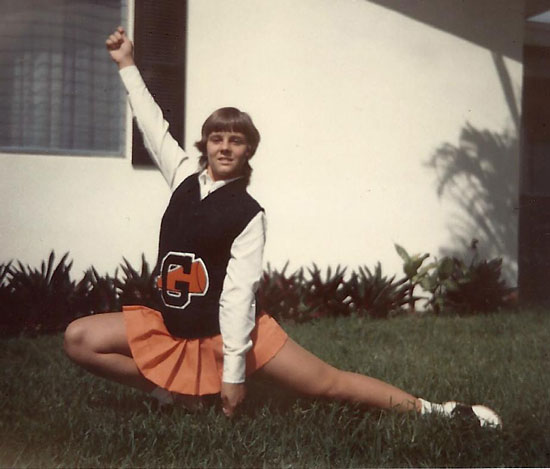
Debbie: Yes, I was a cheerleader for the Wilton Manors Gators, yeah...that was entertaining. That was an unfortunate haircut in that picture, too. Oh my god! What was I thinking? It wasn't the last one either...(laughs) trust me.
Jeff: But you also posted a couple pictures of you and Brenda that suggested you two might have been a coupla troublemakers.

Brenda and Debbie
Debbie: Ah yeah. Well, we're just a couple years apart (in age), and basically, whenever I was allowed to do anything, she...like, was grandfathered in on it. Yeah...this is fast-forwarding a few years, but, I was gettin' into bars at 16. She was 14, and she was getting in with me, with the fake IDs I was making. Yeah, we were pretty much partners in crime, until we got a little older, and then we started being interested in the same boys, and then...
Jeff: There was a conflict there?
Debbie: I threw a KNIFE at her once. And it stuck into the wall, BOING!!! I threw an iron at her once. It was over "he who will remain nameless", because if he sees this...But he knows who he is! (laughs)
Jeff: Did you listen to a lot of country music growing up?
Debbie: It was what I liked, I mean, I enjoyed that kind of music. And it was really a natural progression from that to rock'n'roll.
Jeff: And you're a big Queen fan.
Debbie: HUGE Queen fan, and I still am. I think Queen...sort of was the turning point for me between doing that kind of music (country), and going to rock'n'roll. I mean, I was listening to Led Zeppelin and things like that, but...a little bit of Cat Stevens. I went from country to Cat Stevens....and then went to Queen, because my guitar player Matt introduced me to it. And I was seriously hooked after that, I was a Queen fanatic for years.
And I saw them live twice. And both times, I was there the day before, and sat all night and waited for front row with my sister Brenda. And the second time, with general admission, there was always that run for the stage when they finally opened the doors. And I was running for the stage, and these guys came and completely ran me over. I was trying to protect my camera, 'cause I fell because they tripped me. My camera hit my hand and sliced me open. And it definitely was a stitch-worthy event, but I got front row! And after the show was over, we went to the hospital. But we were blocked in, so we had to wait for another hour for the people to leave, and unblock our car. Went, got stitches, the whole nine yards, and I got the scar to prove it. And the funniest part of it is that there's a gentleman who is one of my facebook friends (Robert Slade Lemont) who was one of the people who was in the front row with us. My sister passed out, against the barrier, 'cause people were pushin'. The guy remembered that, and he's actually one of my friends, to this day. And that's how I ended up meeting Robert (Mascaro). I was actually performing with a band doing Queen covers, and different covers.Jeff: So you went to Fort Lauderdale High School, with The Cichlids drummer, (who does not want to be referred to by name in this interview, and through the rest of the interview will be referred to as "the drummer".)
Debbie: Yeah, that's where the drummer attack began. (laughs) That was never a good thing back then...The drummer was a member of, sort of an alternative group of people. And he also had played drums for the person I was dating at the time. And that's how we sort of met. But we also, when I got an all-girl band together, we also had bays in the same warehouse complex. And he would always come over and harass us, came and spit on my windshield once. Yeah, he was a bit of an ass-basket back then. He used to run up and down the halls in a black cape with his friend Nihasa...they claimed to be Satanists but I think they just liked the capes. (laughs) It always was like he was a little schoolboy, tormenting me.
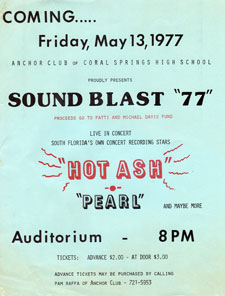
Jeff: Bob Rupe said the drummer brought him to your warehouse one time, do you remember that?
Debbie: Yes he did. I didn't know him at the time, but I do remember, 'cause they were buddies at the time, yeah. We were doing acoustic, and also we were doing Lynyrd Skynyrd, we were doing Zeppelin...really badly. Um....you know, a bunch of stuff from the seventies...
Jeff: Is this before your band Sheba?
Debbie: This is pre-Sheba, this is all girls. Diane Barron, who is now Diane Johnson, was in there. This is after Lisa (Nash), because we replaced her with Diane.
Jeff: Pandora's Box was the band with Lisa Nash?
Debbie: Yes, that was with Lisa, and a drummer named Cindy, and Brenda on guitar, and myself playing guitar and singing. With the WORST bleached hair that ever existed, you've seen the pictures. But...it just didn't work out with Lisa. And we got Diane, and Diane's ridiculously talented, an amazing bass player. I don't know who came up with the brilliant idea to get together with the Colias brothers and start a band, but we did that. And that was Sheba, yeah.
And at some point in there, there was a band called Hot Ash. My tenure with them didn't last very long, but their manager was courting me, to come join their band. It was a 3-piece unit, and I guess he figured that the best way he could lure me in, was to show up at the door of our warehouse with Leon Wilkeson from Lynyrd Skynyrd. Yeah, this was when they were recording "Street Survivors" (summer of 1977), and I was going out with him for a little while.
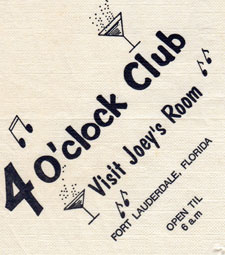
And fast forward...we all ended up back together, and ended up putting a band together called Sheba, it had both the Colias brothers in it, and my sister and myself. It was basically like a Fleetwood Mac of local rock cover bands.
Jeff: And from what you've told me, that band played a lot around the area.
Debbie: Oh yeah, we played out a lot, we did a full-time thing at the 4 O'Clock Club and at the Rock Casino.
Jeff: You mentioned you played in Clewiston.
Debbie: Ah man, Clewiston, I'd go back there in a heartbeat, that place was a BLAST. They thought we were rock stars there; they'd all come piling out of their trailers into this...club, the one club in the city. And MAN, afterwards they were having parties for us, and making this stuff they called "hunch punch"...I have no idea what was in it, but we just drank it anyway.
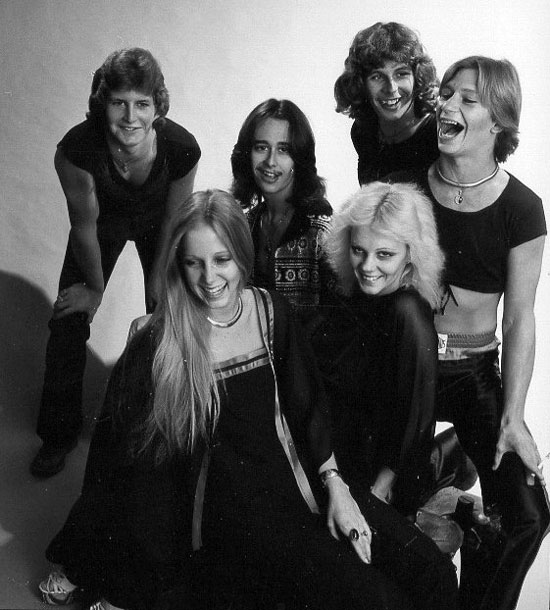
Back row: Judd Williams, Matt Colias, Andy Colias and Tom O'Riley
Front row: Brenda Blake, Debbie DeNeese
Front row: Brenda Blake, Debbie DeNeese
Jeff: After a couple of drinks, you probably didn't care what was in it!
Debbie: Yeah! It's the first time I ever saw somebody shooting up heroin. I went to use the bathroom, and there's somebody in there shooting up...
Jeff: In Clewiston???
Debbie: Yeah, in Clewiston. I guess it's boring over there, I dunno. Yeah, they were all shooting up in the bathroom, we did NOT partake of that. But we did drop acid and go out and walk around with the Brahma bulls there. The sun was coming up, and we were wandering around in a field. And as the mist (fog) was clearing, there's these gigantic bulls in the field, and they're lookin' at us...Yeah, it was some crazy times...but I wouldn't trade it for the world.
And the other two guys (in Sheba), the bass player and drummer, I just recently re-connected with them, Tom and Judd, they're up in Watertown, New York, they went back to where they came from. They're really good guys, and still playing to this day.Jeff: What was it like being in a band with your sister?
Debbie: Interesting, especially since we had both dated both of the Colias Brothers. Like I said, it was like a local Fleetwood Mac, I mean, it was crazy. But Brenda, I don't think, had the same hunger to go into that (music). In hindsight, she made the better decision, long-term. I mean she liked to sing, and has a beautiful voice which harmonizes well with mine, but I don't think she was prepared to do the crap that you had to do to get there. So I had an appointment to go interview with AT&T, which at that time was Southern Bell. And she took my appointment, and she got the job, and she was with Southern Bell, or AT&T or Bell South, or Ma Bell, whatever you wanna call it, up until...5 years ago.
Jeff: Some of the EAT guys worked for Southern Bell also.
Debbie: I know! And my father was also with them, and my aunt. So it was a family thing. I was kinda expected to go there, but I ended up being the black sheep.
Jeff: How long was Sheba around?
Debbie: Too long (laughs). I don't know, maybe....8 months. 6-8 months.
Jeff: And then the story goes, that Robert Mascaro saw Sheba at the Rock Casino.
Debbie: Yeah, he did. If I remember correctly, and it's a little fuzzy, because I didn't find it to be important event at that time, was that Robert came in to the Rock Casino one night when Sheba was playing. And he was looking at me, and I guess he was comparing me to Cherie Currie (Runaways). I don't know what he saw, because I was doing these horrendous poseur covers of Queen, and I had this ridiculous Cherie Currie blonde hair.
I just remember this. He came over, and he had a leather jacket on. And...oh God, that thing smelled like somebody died in it, but...(laughs) but he put it on me, and he said, "Perfect!" And that's where it started, you know? And I had to break up that band, and he didn't want anybody else from that band....Naturally, because they would never have understood the kind of music that we'd be playing.Jeff: Plus it would mean less control for him.
Debbie: Bingo, yeah. He basically owned me at that point. But yeah, that's where that started, and he came down and started talking. We started talking about putting something together. That's...what happened...he had friends that owned a beauty salon.
Jeff: Robert did?

Debbie: Yeah. And he took me there, and the first thing that he did was have 'em color my hair back brown, which was a....wonderful thing, because it was ridiculous.
Jeff: The blonde look wasn't working for you?
Debbie: It was not, my hair was so fried, Matt used to call it "baby bird fluff", 'cause when I woke up in the morning, it would be all twisted up and fuzzy, oh, it was awful.
Jeff: So you've said that Robert talked big.
Debbie: Oh, he sure did, and EVERYBODY else thought he was full of shit.
Jeff: I'd imagine the folks in Sheba warned you off him.
Debbie: Yeah, oh yeah. They thought it was just, they were laughing at me. My sister...just didn't like Robert. EVER. Still doesn't. Never will. There were no redeeming factors where she was involved, or my family was involved. You know, my parents were...I brought him home one Christmas, and...
Jeff: And you were, what, 19-20 years old?
Debbie: I was 20.
Jeff: And you brought him home for Christmas? Christmas with Robert....?
Debbie: Well, I moved out pretty quickly, because my father told me, "Either get a real job, or you're gonna have to move out."
Jeff: But how did the Christmas go?
Debbie: Aye-yay-yay! It was just, everybody tolerated everybody else. I think there was a lot of alcohol involved. WHEW! Oh my god, yeah.
Jeff: And you moved into what became the Cichlid house?
Debbie: Yes, that's where he was living, Robert and a PILE of books, all over the house, the house was just FULL of books.
Jeff: And did you meet Charlie Pickett right away? Or he moved there later?
Debbie: Yeah, well, he was kinda...he was still with his first wife then, and they lived in a different location. There was a guy living next door, I don't know what his real name was, they called him ZONE. Charlie didn't move in there until later, but we did see him fairly often.
Jeff: Did you know he played? Or was he just a friend of Robert's?
Debbie: Um....It wasn't really apparent at that time. I mean, I was making a lot of adjustments, with moving out, starting a band...I was flying by the seat of my pants at that point.
Jeff: And Charlie told me that the band Such Trash occurred before your time?
Debbie: Yes, definitely, Such Trash was before I came around. That was Robert's first band that he managed, and I think he was also managing Z-Cars at the time.
Jeff: And he was in Such Trash for a while, with Charlie.
Debbie: Yes.
Jeff: And Robert claimed that Such Trash was the first original Florida punk band.
Debbie: Well, I was not involved with punk prior to that, so I can't make any judgement. But I know he did sing with them for a while.
But I think he was definitely better qualified in the promotional department, and management....not perfect, but as far as getting a band....to go from 0 to 100 quickly, that was definitely his skill, not as a front-person. (laughs)Jeff: Absolutely, none of this would have happened without Robert's vision, we wouldn't be talking, Charlie wouldn't be playing...
Debbie: A LOT of people, I mean, I don't think Z-Cars would have gotten as far as they did. A lot of things probably wouldn't have happened; Robert was definitely the catalyst for it. But, he was also the.....the plastic explosives to blow it up too, but.....(imitating Robert), "I made you, I can take you down!"
Jeff: Was there a lot of that?
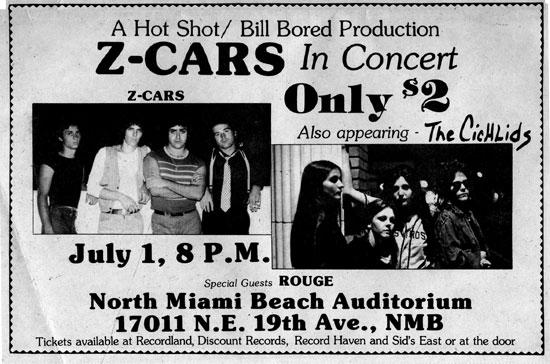
Debbie: No, he never said that to me, because I don't think he EVER thought that I would leave. I don't think that was even a glint in his eye, but we'll get to that later.
Jeff: So talk about the band you call the Kitlids, the all-girl version of the Cichlids. With Kit Carson and the drummer with no legs, Lisa. How long did it last? How much did that band play out?
Debbie: I think we only played out a coupla times, with that particular lineup. We replaced Lisa, the legless drummer, with a guy named Pete Signore, and we played out a couple times with him as well.

Cichlids version 1, L-R Diane Barron, Lisa, Robert Mascaro, Debbie and Kit Carson
Jeff: You told me Lisa couldn't keep up.
Debbie: She couldn't do it. And...Robert never even TOLD us! I didn't find out until we went to a bar, and she was trying to sit on a barstool, and she couldn't. Because she was...she was born without legs due to some medication her mother took when she was pregnant. And it was high, and she couldn't sit on the barstool.
And now I started to understand why she couldn't keep up with the faster songs. He (Robert) never told us! So that's where I found out. How do you fire somebody, at that point? When you find out that they're disabled? I'm like, "That's YOUR job. (To Robert) You got us into this, you get us out of it."And then Pete (Signore) joined, and we did the North Miami Beach (Auditorium) gig, which was kinda was like the official coming out. The REAL first (Cichlids) gig. We did some stuff (earlier small gigs) over on Dania Beach Boulevard, you know, those little places (bars), a couple of those places there. But then we did the North Miami Beach thing with Z-Cars.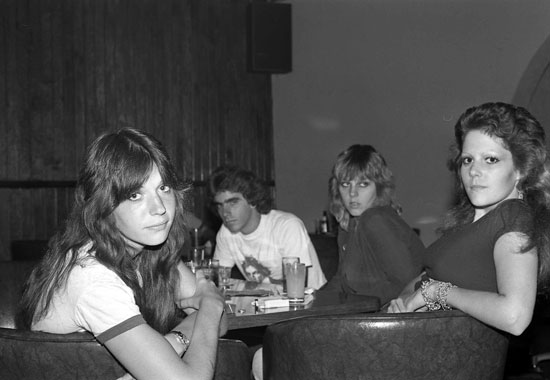
The second version of The Cichlids, L-R Diane Barron, Pete Signore, Debbie, Kit Carson
Jeff: How was the reception?
Debbie: Pretty good!
Jeff: You'd been onstage a buncha times before that. How was it different then playing with Sheba? Or was it the same?
Debbie: I didn't know what to expect because it was a completely different kind of music that most people didn't know anything about. I believe that because we had an audience that was familiar with Z-Cars, that we had a little bit more favorable reaction than if it was just a cold audience who'd never heard that stuff.
Jeff: That makes sense, Z-Cars was an energetic band, short songs, poppy...
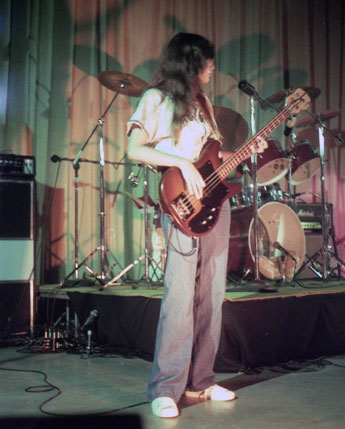
Diane Barron, first official Cichlids show,
North Miami Beach Auditorium, July 1, 1978
North Miami Beach Auditorium, July 1, 1978
Debbie: Exactly, it was kinda the same genre. But then....everything started getting...wacky. And Diane (Barron, bass player) quit, because she couldn't take Robert anymore. And she didn't feel challenged by the music, it's 1-4-5 (common chord progression), I don't blame her, Diane's a very accomplished jazz bass player.
We got a girl named Heidi that I had been in a band with before. And she was a bass player, and....she didn't last very long because she...she was living with us, and she was a THIEF. Her modus operandi was to go to bars and drug these guys, and go to their apartments and rip 'em off! And then she discovered an eight ball of coke in my jewelry box, and it had a razor blade lying next to it. And I guess when she went to grab it; she cut herself on the blade. And I went in to my room, and I look, and there's a blood trail going from my jewelry box into the kitchen, over where the kitchen sink is, and then back into where her bedroom was.Jeff: She didn't even try to cover up her mess??
Debbie: No. I don't know if she knew it (the cocaine) was in there, I guess she was just looking for something to steal, and she found that. Anyway, she was (laughs) ingloriously kicked out of the house in her pajamas, with her suitcase and all of her crap in it! Threw her out the door, locked the door, and left her to her own devices, and she got a taxi out of there. Yeah, that pissed me off so bad!
Jeff: Probably never heard back from her again...
Debbie: Oh no, no, didn't hear back from her again. Yeah, she claimed she was supposed to jump Snake River Canyon, and all this stuff. She was a pathological liar, a crazy person, and her friend (a drummer) had Turret's Syndrome, and it was....you can't make this shit up, (laughs) I'm not joking!
But yeah, we had her (Heidi) for a little while, we never performed with her though, she didn't last long, she screwed up before she had a chance (to play).And then.....There was a little.....I forgot what actually happened with Kit (Carson). Kit kinda went off the rails...Jeff: You talked about her before, about how she was very talented, but also very troubled.
Debbie: She.....I just don't think she lived in the real world. You know? And she also.....she had some substance problems, SERIOUS substance problems. And she was.....Her father was a.....a major, or some really big dude in the army. And she was definitely rebelling, in a lot of ways. But.....I'm trying to remember exactly how we separated with her...because she was just like, not showing up for practices, and....So we took a little hiatus. (NOTE--Kit Carson's real name was Catherine Brayley, and sometime after leaving The Cichlids, she returned to Washington DC, where she was involved in punk bands The Nike Chix and Sybil. lived with Alec MacKaye, and her 1989 heroin overdose inspired the Fugazi song "Shut The Door")
Jeff: About this time period, you went into a studio with Charlie, Robert, Kenny Lindahl, and learned how to record and overdub, do you remember that?
Debbie: Oh hell yeah!.....I'm trying to think if that was my first recording, I think it was, actually. Oh yeah, it was awesome! It was Barry (Seiver) and...Tony (Mancino) was in there too, I think Tony was actually engineering, it was over at Barry's house.
Jeff: It was a home studio?
Debbie: Yeah. It was a home studio; it was in Barry's house. Yeah, it was an interesting experience. I loved it. I absolutely loved recording, it was a lot of fun. I just remember equipment was piled up in Barry's...not in the recording area, but I remember gear was piled up in Barry's place. They did a pretty darn good job, considering.
And then The Cichlids regrouped, got back with the drummer...And at that time it was me and the drummer, we just mutually appreciated each other's abilities. And I'm trying to remember...Jeff: Allan Portman was next.
Debbie: The drummer knew Portman from selling bathing suits, or something like that.
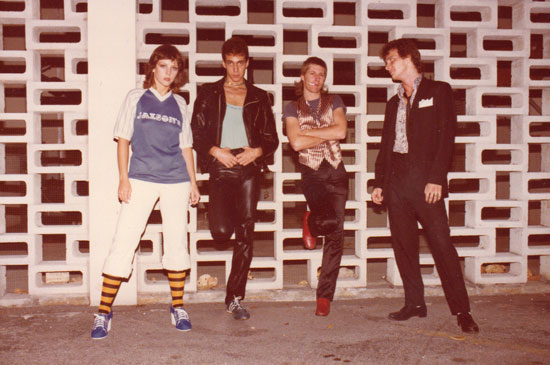
L-R Debbie, "the drummer", Ted Rooney and Allan Portman
Jeff: And you had Ted Rooney from Tight Squeeze on bass before Susan, but you said that band never played out.
Debbie: No, we never played. It never worked out.
Jeff: And the drummer brought some songs.
Debbie: Yes, he brought songs. And I started writing songs. Some of them were just absolute crap, but... then we collaborated.
Jeff: And once you got Susan, things started going pretty fast. There was an article in Mouth Of The Rat after the first gig....
Debbie: Yeah, well.....I'm thinking back.....We had this little den area, and all kinds of people would show up, I remember that. But I don't even know how Robert and Mouth of the Rat got hooked up, but I'm sure it was a large part of the reason why things started taking off. And, of course, Rag Magazine also...
Jeff: So you've got the ideal Cichlids line-up together, you and Susan, and the drummer and Portman. When you started playing together, did you know right away that this was it? Was it way better or way different than what you had done before?
Debbie: It was SO different, it was so different, and the music was so different, that I had NO idea what was gonna happen. It's like we basically grew together, you know? We started out, and we grew together, and it was just serendipity that the chemistry between the four people was a good balance.
Jeff: It was an amazing balance.
Debbie: It was a GREAT balance, and we were IDIOTS to ever try to change that. You work your problems out, because....there's always a first line-up of a band that does something like that, it's always gonna be the best.
Jeff: Everybody says, including you, that it was never the same after Allan Portman left.
Debbie: It wasn't. And it wasn't because Barry (Seiver, Allan's replacement) wasn't talented. He's very, very talented. But the balance was thrown off.
Jeff: It was a chemistry thing.
Debbie: Yeah, and we had a person playing each part, you know?
But I had no idea, to be honest with you, from the beginning of it, I thought it was hysterical. I felt like a fraud. Because I'm out here playing 3 chords. And singing these.....Not singing to my ability, but basically shouting, and.....people are eatin' it up! I used to work on performing, and really working on my voice, and getting this right, and I NEVER got this response before! I thought, "OK. This is fun, I'm enjoying it." So I started really buying into it, and...Jeff: Do you think it was because it was something people hadn't seen before, or was it the chemistry of that line-up, or a little of both?
Debbie: I think it was a combination of both. I think it was timing, the fact that people had never heard it before, and it (punk rock) was starting to take off in some places, and they'd heard rumblings of it, and DEFINITELY the four Cichlids. As much as I bitched and.....groaned because Robert always made Susan the sexy one, and wanted me to be the other one...
Jeff: The tomboy?

Susan Robins
Debbie: You have NO IDEA...of the HELL that I gave him because of that. He was absolutely right to do it, it was necessary; it was an important part of it. Oh, but I hated it! I used to go NUTS because of that. He would tell me not to wear this, not to wear that, and then Susan would come out in garters and a skirt! And I'm like, "You know, you're makin' me look REALLY BAD here!"
Jeff: That wasn't the case Debbie, that was just in your head!
Debbie: Well, thank you, that's very sweet, but in my head, it's like, "Do you not want people looking at me? Is that the problem?" But I understand now, I was putting the effort into performance, and writing, and everything else, and.....it makes sense NOW, but when you're 21 years old, and this is your first experience with this kinda thing...yeah, I was a brat. But.....it happens.
Jeff: Charlie always tells the story about asking you about the LARGE quantity of energy that you put out onstage. And that you told him, "I always give 110%. If it's going great, if it's going bad, I give 110%, if it's out of tune and falling apart, I give 110%." And that it impressed him enough that he adapted it for his performance. Was that something that Robert imprinted on you, or did you get that somewhere else?
Debbie: Yeah, actually....Robert reinforced it, but I had always felt that way, because even playing in that really crappy cover band, I would go out there, and there were nights that I would come home and I would be coughing up blood because my throat was so irritated. I just never thought about not doing it that way. You know, it's....still, to this day, if I go up and try to play, I can't...It's hard to tone it down. (laughs) It would be a good idea to be able to do that, but it's just not something that I've been able to do.
Jeff: That's probably part of what attracted Robert to you, because not everybody can do that!
Debbie: Probably, probably. I dunno, I guess it's something you have, or you don't. I remember, even doing the cover band thing, I could never dial it back; I never was able to do that.
Jeff: And at the first gig by the classic line-up of The Cichlids, outdoors at the Musicians Exchange, I guess there were some hippies there who got their minds blown....
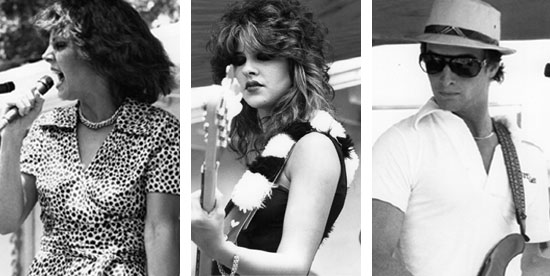
Debbie DeNeese, Susan Robins, Allan Portman
First gig of classic Cichlids line-up, Musicians Exchange, June 17, 1979
First gig of classic Cichlids line-up, Musicians Exchange, June 17, 1979
Debbie: Oh my god, and one of them happened to be Andy Colias, who was the guitar player in Sheba, and one of my ex-boyfriends. And he was just standing there with his jaw hanging open, he couldn't understand why people were getting SO excited, about a bunch of people up there playing four chords, and screaming and jumping around, and wearing the stuff that we were wearing. And the people were lovin' it! They loved it! They absolutely loved it, and again, that was our first real performance. And it went super, super well. Well, how far wrong can you go, with that amount of chords and that amount of lyrics? But yeah, they ate it up. And we were starting to tell each other, "Maybe there really IS something happening here!"
But yeah, Musicians Exchange, we revisited that place several times, and it was always wonderful, it was a real fun time, Don (Cohen) and Sheldon (Voss) were good dudes. They knew us, the guys from Musicians Exchange, Brenda and I had been buying guitars there, and everything else there, since we first started playing. Always...until the place closed...good dudes. You know, one of the times we played Musicians Exchange, Jaco Pastorious wanted to get up onstage and play with us. And he came in all fucked up, into our dressing room, I can still see it, it was a little studio in the back. Robert would have NO PART of it! He just basically shut the guy down, but I don't know if it was so much that he was Jaco Pastorius, but that he was REALLY wasted.Jeff: That actually makes sense, The Cichlids song arrangements were tight, it wouldn't have been a great band for getting up there and having a "jam".
Debbie: I can't even imagine what woulda happened, though I would've loved to have a picture, thinking about it now! But it would've been a NIGHTMARE! We were laughing about it, but that was an experience that actually did happen!
Jeff: Tell me about the time you sang with Z-Cars.
Debbie: Pete (Patrick) lost his voice, and I went up and did a set with them. That was AWESOME, that was great because.....Bruno (Z-Cars drummer) was a big Queen fan, I think they all were. And we did a lot of shows with them, they were great, they were like our brother band. Good guys, and it was fun. And I'll never forget, we did "Tie Your Mother Down" and "Because The Night", which were two songs that I happened to know, and they knew. And we reprised "Because The Night" at the Sheila Witkin re-tape.
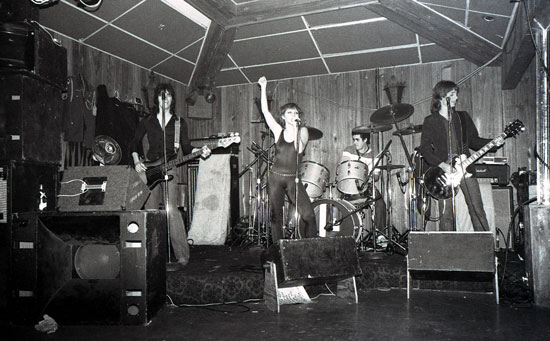 Debbie fronts Z-Cars at Tight Squeeze club, 1979.
Debbie fronts Z-Cars at Tight Squeeze club, 1979.L-R: Ray Harris, Debbie, Bruno, Chris Bacon.
photo by Jimmy Johnson
Jeff: The drummer said he signed a contract with Robert, did you ever sign a contract with Robert?
Debbie: That's a really good question, because I don't remember if I did or not. I remember signing a contract with TK (Records) ... I don't think I ever signed a contract with Robert. Or if I did, I don't remember. And there are some holes there (in her memory), because, believe me, things were pretty intense.
Jeff: Yeah it seems like once you got the classic line-up together, things started picking up pretty fast. A lot of gigs, right away...
Debbie: Yeah, it was like that. It was fast and it was furious, and all I basically was concentrating on was the task at hand.
 Robert lecturing The Cichlids
Robert lecturing The Cichlids
photo by Jimmy Johnson
Jeff: Talk about Robert's management strategies regarding the band, i.e. proclaiming you the world's most hated band, keeping the band away from the public at gigs, nobody in the band can go out socially unless the whole band goes out....
Debbie: Yeah, I think it was actually a pretty darn good strategy. At the time, nobody understood it. It definitely attracted attention, it created a mystique. And it definitely caused other bands to hate us...because they started seeing that we were getting gigs, and things were happening for us that weren't happening for bands that had been playing for a long time, and who thought they played better than us. And all the people back then really felt that they deserved it more than we did. You know? I think it was a combination of the fact that we did manage to put together a pretty interesting performance. And also that Robert knew how to snoop the politics of stuff like that. And he was a total asshole most of the time, but he got the job done. And managed to bring people onboard, to volunteer their time, and take shit from him all the time!
It definitely caused some...very hard feelings. And things got really bad when we got signed. But even before that, we were getting really good gigs. And people just couldn't understand why we were getting 'em, and Robert pissed EVERYBODY off! You know? He would talk crap about other bands; he wouldn't let us go out to see other bands. That's the way it worked! It created a mystique. He knew how to work...the press, how to get us coverage. And he didn't get us...at that point we weren't over-exposed, he only let us play out a certain amount of times.Jeff: Sure, it makes it more of event every time you play.
Debbie: Yeah! That was exactly the intent, and he also, by us not being seen around in public a lot, created a certain celebrity, I guess, by doing that.
Jeff: Were you aware that some of those restrictions were causing friction with the drummer?
Debbie: Oh yeah. That built up pretty fast. And also the fact that they (her bandmates) thought I was getting favoritism. Trust me, I was NOT getting favoritism. I was there in the middle of everything, but that doesn't mean I was getting favoritism. I was probably taking more SHIT than anybody else was (laughs)
Jeff: The fact that you and Robert were in a relationship, you're pretty much automatically gonna get accused of favoritism, that's almost a given.
Debbie: Yeah, but the word "relationship" was a very loose thing when used here. Just because I was using his last name, doesn't mean...(laughs) Yeah.....It was weird.
Jeff: And all credit to Robert Mascaro for making it happen in Florida. He was a visionary, in his way, he was a mastermind. We wouldn't be talking about him if he hadn't done such a good job. But we have to mention the negative that went along with the positive. And honestly, I gotta ask, why did you put up with it?
Debbie: What, the physical abuse?
Jeff: Yeah. Was there maybe something in you that thought you deserved that?
Debbie: No, no no, it wasn't like that at all....
Jeff: ...Or it was worth putting up with to get where you were going?
Debbie: EXACTLY, that's what it was. And he wasn't strong enough to cause me any problem. Look, I knocked the guy out once, out COLD on the kitchen floor.
Jeff: WOW.
Debbie: Yeah, I knocked him out. He threw an ashtray at me...and I clocked him, and he was out cold on the floor. Another time, he did something, and I forget what it was, and I had a Pink Squirrel that I had just mixed, you know the drink? I remember throwing it at him, hitting him in the face, and the only things showing were his two eyes, and his face was covered! That time I was smart enough to haul ass outta there! (laughs) And I'm not a violent person, but man, when he threw that ashtray at me, I was PISSED.
He (Robert) got arrested for threatening an usher at the Hollywood Movie Theater. I don't remember who bailed him out of that, maybe Charlie remembers. And he got his ass kicked outside of Tight Squeeze one time, when somebody made fun of his red shoes. And on the way to the photo shoot for the "Lifeguard Dan" single. Tony (Mancino) was driving, we were in Tony's car, and he hit me...I was in the backseat.Jeff: You said he gave you a black eye.
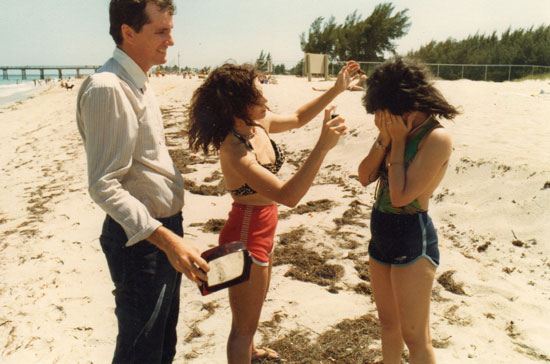 Charlie Pickett, Debbie and Susan preparing for "Lifeguard Dan"
Charlie Pickett, Debbie and Susan preparing for "Lifeguard Dan" single cover photo shoot, 1980
photo by Jimmy Johnson
Debbie: Yeah, but you know what? I was SO determined....I mean, at that point, things were moving forward, and if I had done that (quit, or broke up with Robert), EVERYTHING would've imploded, it would have been all over with, so....I just basically started to learn how to....avoid confrontation with him. I just didn't press his buttons anymore. And just keep myself interested in other things. Kept myself writing, and always tried to have as many people around as possible. And Susan was living with us at that point, so that stopped a lot of it too.
Jeff: Susan said that's the reason why she decided to quit the band, and that she only agreed to do the tour to give Robert time to find a replacement for her.
Debbie: I.....I don't remember exactly what that issue was, I didn't see it happen, but I do believe it. Look, he pushed my sister! Yeah, he pushed my sister against a wall, because she was...I forget what it was, but she was pissed off. I wasn't there when it happened, but there were other people that told me, that were there with her, that saw it happen.
But I definitely.....I made.....I.....made some...moral sacrifices at that point, for what was going on, because we had already put SO much work into it. For so many people. And it wasn't just the band; it was...all the other people, the support people, too. And so I just dealt with it. But like I said, I did learn how to prevent it from happening, and managed to just get somebody else to handle him. Tony (Mancino) did a lot of diffusion for me, and deflection, and used to keep him (Robert) busy.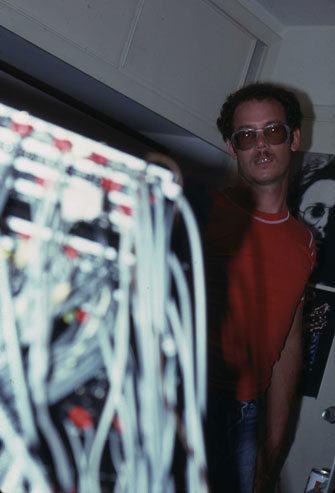
Tony Mancino
Jeff: And this was before you and Tony got involved? That was after The Cichlids broke up?
Debbie: Oh yeah, this is before Tony and I got involved, he was basically watching out for me. We were like friends, and it really didn't start...as soon as I got back (from NYC), but shortly after that.
Man, you're reminding me...this was a long, strange trip. The day I broke up with Tony, he drowned THAT DAY!Jeff: WOW!
And you had another outlet for your creative abilities, because you made your own onstage outfits for years. Did your mom teach you to sew, or did you learn it in school?Debbie: My mom taught me the basics, but...I got hold of a pattern-making book. And we couldn't afford to go out and buy the stuff, and also Robert wouldn't let us, except for Susan, she was allowed to wear Sasson jeans and everything, but I wasn't allowed to wear that stuff, I had to wear Levis and t-shirts. UNTIL...I discovered that you could go to the thrift shop and buy all these old '60s clothes, and re-make 'em. And, you know, re-cut 'em....
Jeff: It's DIY, punk rock!
Debbie: Exactly. So once I found that, I dragged my mom's old-ass (sewing) machine down to Dania with me. And then the preparation from gig to gig, the first thing that would happen would be, I would immediately start workin' on the clothes. Oh yeah, it was awesome! It was fun, and they were different. You KNOW nobody else would have the same clothes! Because nobody else would find that stuff.
But Susan and I, our favorite pastime was going to all the thrift shops up on Federal Highway in Dania. Yeah, we'd pay $2 for a whole bag of clothes. It was responsible for the look of the female people in the band. And the guys would poach our stuff, too.Jeff: At the time the Cichlids were picking up speed, there seemed to be some friction between the Cichlids and the Screaming Sneakers, and your former bandmate Lisa Nash. What was that about?
Debbie: Well, Lisa would laugh about this too. She got kicked to the curb (earlier, in Pandora's Box) because she couldn't play bass. So fast-forward a couple years, and we heard there was a band called Screaming Sneakers. I had no idea who they were until the first time I saw them, and I go up there, and I see it's her. And, "You've gotta be friggin' kidding me! This girl's in a band?" And I remember that first gig, she was wearing these...she was definitely going for the Blondie look, right? But she had these knee-high boots on, but she was using electrical tape and cardboard to make 'em thigh-high boots. And I wanna tell ya, "Oh yeah, that says it all right there, that just says it all."
Now granted, she had a nice voice. And she did pretty darn well for herself, you know? I definitely respect what she did in that band, they did good stuff. But you have to know that...And that also did not make for a really good relationship between us and Screaming Sneakers, because she seriously held a grudge about us.....separating from her.Jeff: So there was no grudge from your side?
Debbie: No, I didn't hold a grudge, I really couldn't care less. At that time, we were kickin' ass and taking names, so I just thought it was hysterical. I'm sorry; I was laughing my ass off! There might have been a grudge with other people in the band, 'cause I knew the back-story. And at the time she was with us she could not play bass to save her life.
But...(sighs) Oh man. I can't believe all this stuff really happened.Jeff: You told me you got to meet Jackie Fox from The Runaways.
Debbie: Yeah, I walked out in a t-shirt and spandex, like I'd been sleeping, walked out there half asleep, at The Cichlid house in Dania, and Jackie Fox is sitting in a chair in my den. And I'm like, "Hmm, ok! What, where, how?" I have no idea how she ended up there, somebody else might remember that, but somehow Jackie Fox was sitting in there, and I forget if Robert was trying to get her to come into the band or something, I don't remember what it was. You can imagine that, at that particular time, The Runaways were a pretty big deal, and probably a huge reason why The Cichlids even existed, and she's sitting in my living room. I mean, really nice girl, she's really, really nice, but...again, there's so many weird things that happened, in this band. And again, Robert made that happen. I don't remember how he did it, and I don't know if you'd be able to get it out of him.
Jeff: But there was no jam with Jackie Fox.
Debbie: There was no jam, unfortunately. That would have been really nice.
Jeff: Now when The EAT started, they played with The Cichlids a buncha times.
Debbie: Yes, they did.
Jeff: What did you think of The EAT then? What do you think of what they accomplished, and the recordings they did?
Debbie: I think their stuff is awesome! I mean, at that time, I was into more melodic stuff, and they weren't as melodic. They were more punk than we were. We were more pop-punk, they were more punk. But they were awesome guys, I really like....At that time, though; it was almost like Robert really wanted us to not be cool with them. He....encouraged....the animosity between us and other bands. Yeah, I think he thought it made us sharper or something.
But The EAT wrote amazing songs! I thought that they had some fantastic songs, The Reactions too.Jeff: And The EAT have said that they were inspired by The Cichlids.
Debbie: Yeah, but we weren't allowed to...we're not supposed to "lower ourselves" to....like other local bands. And I think it only made the whole scene stronger if everybody supported each other. But Robert did not encourage that, he discouraged that. Except for Charlie (Pickett). But Charlie bloomed a little later than us. He was not really at his top level until we were already... (gone) There was a cross-fade happening there.
Jeff: Speaking of Charlie, he also had his first gig opening for The Cichlids. Do you remember that? There are pictures of you and Susan and Joe Harris watching him play...
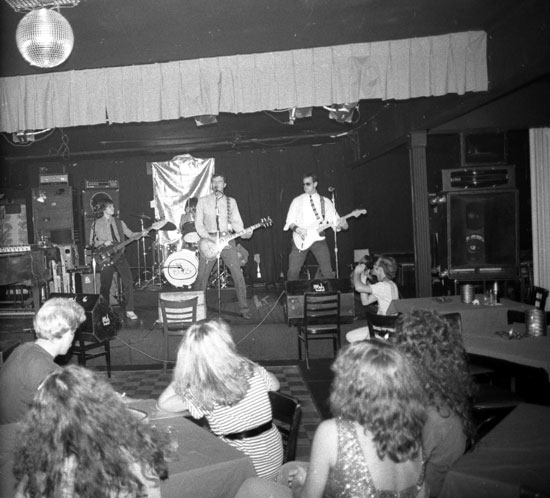
Joe Harris, Debbie, Susan and others (backs to camera) watching The Eggs first gig,
opening for The Cichlids at the Premier Club, 1979.
Onstage is L-R Mitch Mestel, Joey Caleri?, Charlie Pickett and Barry Seiver.
photo by Jimmy Johnson
Debbie: It sounds crazy to say that, but yeah. He's like, been one of the nicest people I've ever known in my life. But it was....it was cute, because it was before Charlie got his real feet....
Jeff: He's admitted that he was nervous going onstage for a long time.
Debbie: Yeah, but the thing is, he got up there, and he made it happen, and.....he had his own sound. At that time, it was not really my particular taste in music, but the way he went out there, with such commitment, and with his.....I don't wanna say 'country boy', but you know, that laid-back kinda charm? It's like you couldn't help but love that performance, I loved to watch him. It was awesome, and again, that....it did make us feel like more of a community, when you see somebody like that, that you know, up there doing it.
And look what's happened over the years! He's just amazing! He's amazing, and his humility, I think...is something to be admired, and it's something I often think about. I could use a dose of that every now and then. (laughs) He's awesome.Jeff: And you sang on a couple of his records, with your sister. How did that go?
Debbie: Oh, it was so much fun! "If This Is Love ", I think I remember doing, and "White Light White Heat". Those are the two that come to mind, probably the only two I did. But yeah, that was a lot of fun. Recording with Charlie was so cool, he's just, again, so laid back, and that's why his stuff always sounds so coherent. Cause everybody's relaxed.
Jeff: So you opened for The Police in October 1979, and that was the first time The Cichlids opened for a national act. What do you remember about that?
Debbie: Yeah. That's when we officially became the most hated band.
Jeff: The drummer said that you were all pretty nervous being on a big stage for the first time.
Debbie: Yeah, but it was the Gusman (Hall) stage. And it wasn't a big stage by the time we got onto it, because the buggers had their whole drum kit up there, and we had to set up in front of it. I had a little strip (of stage), probably about the width of this table, to move back and forth. And that was important to me, 'cause moving was part of my deal, you know? So.....
But we did it, and our people were there. And it's like, "Oh my god, we're opening for The Police, and there are people here that are going crazy and rushing the stage for US!" And that was another click in the direction like, "Wow, this might actually be something going on!" Oh, it was awesome! And Sting had to use Susan's amp (or bass, not sure). I don't remember why. And I also remember, the guitar player was chasing my sister around backstage.Jeff: Really? Andy Summers was after Brenda?
Debbie: Oh my god. He was so drunk! And she was looking good! But c'mon, it was The Police, it was awesome! The experience of actually being in a real dressing room, and going out on a real stage. I think there's pictures of me with my parents backstage.
Jeff: What did they think?
Debbie: You know, the music wasn't their (taste), but they were like, "That's my girl!" It was cute, it was really really cute. Those were the things that I enjoyed, because you go out, you do your job, you give it 110% for the set, and then you recharge, and get ready for the next one.
Jeff: You go to Peaches Records in Ft Lauderdale and play on Halloween!
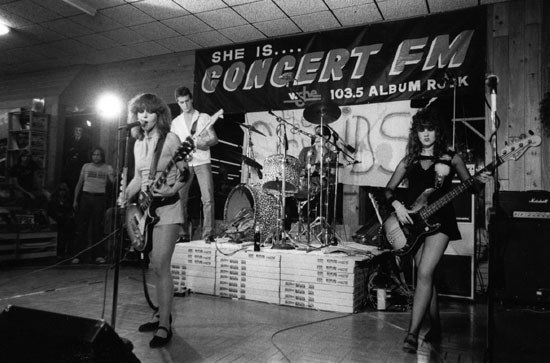
The Cichlids at Peaches Records, Ft Lauderdale.
photo by Jimmy Johnson
Debbie: Ah yeah, the great thunderstorm...
Jeff: And fortunately we have a recording of that one.
Debbie: You know, even though it (the stage) was at ground level and everything, it was a lot of fun! It was intimate...Even though there were technical problems because there was a storm going, and it was being broadcast live, and because of the storm, the broadcast got kinda screwed up.
And my grandmother was at that one, in the front row. And everybody was dancing really nice, and trying to help her out. She had Alzheimer's, so she probably had NO idea what the hell was going on, but she had so much fun. And she had a (guitar) pick stuck on the bottom of her shoe, and somebody saw her take it off, and they asked her for it, they wanted the pick...(laughs)Jeff: ...That was stuck on the bottom of your grandma's shoe!
Debbie: These are the things that come to mind about that, but it was a lot of fun.
Jeff: It's amazing that you remember that.
Debbie: Some stuff is clear as day, and some stuff that should be clear, is just fuzzy. But again, there was a lot of stress going on. There was so much happening, and then dealing with Robert. And then dealing with Susan being pissed off at Robert. And then the drummer...when he comes in at 10 o'clock in the morning, and we have a bottle of vodka on top of the refrigerator, and we're getting ready to go over to Tampa, he takes the bottle down and drinks about a third of it, because he's so coked up. Oh yeah! That was the fastest set we ever did back then.
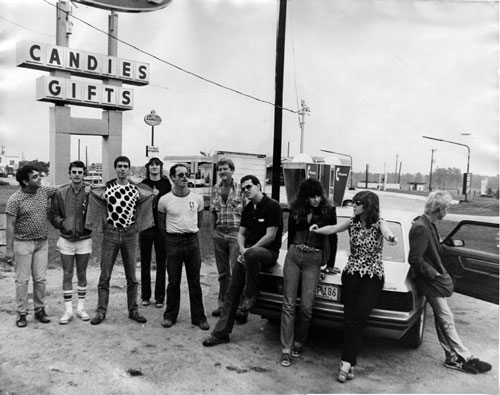
The Cichlids and entourage stop at Yeehaw Junction.
L-R Robert Mascaro, Alan Portman, Bobby Tak, John Daniels, Tony Mancino, Jeterboy, Barry Seiver, Susan, Debbie and Dave Parsons facing away from camera
L-R Robert Mascaro, Alan Portman, Bobby Tak, John Daniels, Tony Mancino, Jeterboy, Barry Seiver, Susan, Debbie and Dave Parsons facing away from camera
photo by Jimmy Johnson
Jeff: Do you remember playing in Tampa with Zenith Nader, and they accused The Cichlids contingent of bringing bad Quaaludes to Tampa?
Debbie: That never happened. That DID NOT happen. No, no, we did not. Quaaludes were not part of our...I did not do one Quaalude when I was in The Cichlids. We never brought any bad Quaaludes over.
I mean, I'm sure the drummer brought coke over, because literally, he came out there and, I was GOING TO KILL HIM. Because he played so fast, I think we did what normally would've been a 35 minute set in about 20 minutes. I couldn't get the words out. Allan was looking at me, he couldn't play fast enough. And I couldn't get him to slow down, I was trying to get him to slow down, and he was just...Yeah, that's when things started getting really bad. And it wasn't the first time that coke affected his timing. And it was a HUGE factor in a lot of the problems we had.But I don't know where they got that (accusation). Maybe the drummer had some on him, but I KNOW Portman didn't, I know Susan didn't, I know I didn't, Robert didn't, and Tony didn't. Kenny (Long) and John (Daniels) would never be bringing stuff, so unless the drummer brought 'em, it didn't happen.Jeff: Ok, you opened for the Ramones a couple times. And you got to meet Johnny Ramone
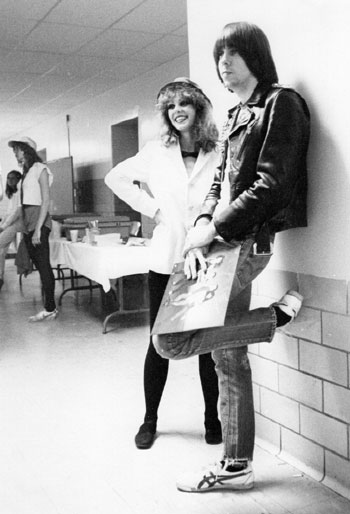
Debbie backstage with Johnny Ramone
photo by Jimmy Johnson
Debbie: Yeah, those were like, my favorite shows. Oh yeah, I actually got to meet all of them. Yeah, it was awesome, Johnny was my hero, because he's the right hand (makes strumming motion with right hand)...and that Mosrite (guitar), you cannot beat that. And I was inspired by that, I thought that was like, an amazing technique, and I worked on that and worked on that and worked on that, cut off part of my finger playing that way, my finger's still not 100%. Every time I played, there'd be blood all over the guitar. And I still can't grow a nail properly on that finger, but I don't care, I don't care! It was WAY too much fun. But yeah, Johnny was my hero, and I got a picture with him. That was great, he was really cool!
Jeff: According to everything I've seen and heard, opening for The Pretenders was not quite so cool.
Debbie: Oh no, that was NOT a cool situation.
Jeff: There's an article where James Honeyman-Scott slammed The Cichlids and Robert to (journalist) John Robson, and Robson returned the favor by saying The Cichlids upstaged The Pretenders.
Debbie: And also, Chrissie (Hynde) was, when we were doing our soundcheck, she sat up in the back. Tony (Mancino) was doing sound for us, and they came and taped down all the volume faders (on the soundboard), so that we couldn't be loud. And then when they played, they ripped the tape off, turned it up, said they were trying to keep us subdued.
Yeah, and then she (Chrissie) was just a BITCH backstage! I mean, we went in and talked with Honeyman-Scott and the bass player...Jeff: Pete Farndon

The Cichlids opening for The Pretenders, Spring 1980
photo by Jimmy Johnson
Debbie: Yeah, we went in and hung with them for a while, and they were really cool. But Chrissie was just a biotch! I still respect her, I still think she's amazing but she didn't like us at all. And I guess it didn't help that we did have our people that were there, that were rushing the stage and acting crazy, and they (Pretenders) were like, "What the hell are these people doing this for this local band for?"
But still, (we were) grateful for the opportunities, great shows! You know, fantastic!
James Honeyman-Scott, Chrissie Hynde, Martin Chambers, Pete Farndon with Susan
photos by Jimmy Johnson
Jeff: Did you get to meet Iggy when you opened for him?
Debbie: I did not get to meet Iggy. Ah...Iggy was busy in his dressing room. From what I understand from Tony, there was a line of young girls going in and coming out, and...God bless him!
Jeff: Well, Iggy is, by all accounts, fabulously endowed.
Debbie: Yeah, that might be it, because that's maybe why he needed 20 or 30 people to get the job done!
But still, again, such an honor to do that (open for Iggy). But no, I did not get a chance to speak with Iggy, unfortunately. I would've loved to.Jeff: Ok, and the other band you opened for is 999.
Debbie: Geez, yeah, I forgot about that. Where was that?
Jeff: At the Agora.
Debbie: Oh my god! Wow...I don't remember that gig. That was probably a little later on, because that's when things were starting to get really wacky with both the drummer and Susan, and Portman too! I don't know if Portman was even still with us at that point. Was he?
Jeff: Yes he was.
Debbie: Well you know better than I do, and I did the shit! (laughs)
Jeff: What changed when TK Records came around?
Debbie: All I remember is being at Tight Squeeze, the club, And Robert coming to us, and taking us to the side of the stage, and telling us that TK Records is gonna sign us. "What? Friggin' TK Records? That's KC and the Sunshine Band! What the...? But, ok, we'll take it!" You know? It is what it is.
So...stuff really changed then. Stuff started gettin' real...and I'm feelin' like a fraud, thinkin', "These other bands are really really good, why us?"
Cichlids, Fort Lauderdale Beach
L-R "the drummer", Susan Robins, Allan Portman, Debbie DeNeese
L-R "the drummer", Susan Robins, Allan Portman, Debbie DeNeese
photo by Jimmy Johnson
Jeff: Really? You really felt undeserving?
Debbie: Oh, I did, the WHOLE time, the whole time. I don't think I appreciated what we did until a long time later, until I actually looked at it in a different manner. After the recordings and stuff, I started getting a little bit better about it. I thought, "Yeah, there definitely is merit to the stuff that we're playing, people are enjoying it." And I'm more into entertaining than I am being a musician. I think the total package is SO important, in rock music particularly.
Jeff: Especially punk, it's gotta be high energy.
Debbie: Yeah...it was, of course, wonderful (signing with TK Records), but again, then we REALLY became the most hated band, because of...
Jeff: Jealousy?
Debbie: Exactly, jealousy, and "You guys suck!" You know...
Jeff: We talked briefly about Sire Records being interested in the band around this time. Did you know about that at the time?
Debbie: I knew that it was in discussion. But I didn't know that Robert screwed the deal up until afterwards.
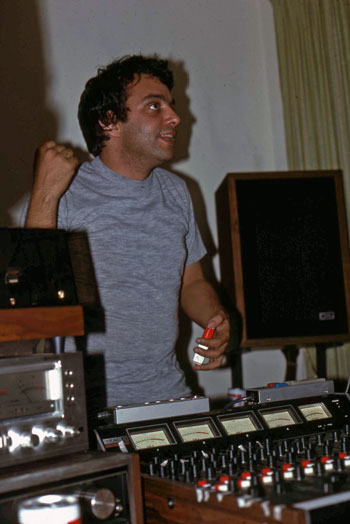
Robert Mascaro in the Studio
Jeff: What I heard was that Sire wanted The Cichlids, but didn't want Robert, which would've meant changing management, and Robert would have had to have been paid off.
Debbie: Yeah ...(TK Records exec [and himself a former pop star] Steve) Alaimo wasn't real happy with Robert either. I found that out, especially afterwards, after I left the band and was looking to do something else.
And that (signing with Sire Records) might have made for a COMPLETELY different experience. We would probably have had a better...they would have had a better understanding of our music, and probably would've had better production on it. I don't hold it against Ann (Holloway, producer of "Be True To Your School"), she was used to doing completely....and there was drug use going on during the mixing of the record, and they came up with something that's just not optimum....Jeff: You had previously mentioned that she had just broken up with her boyfriend, Don Felder of The Eagles?
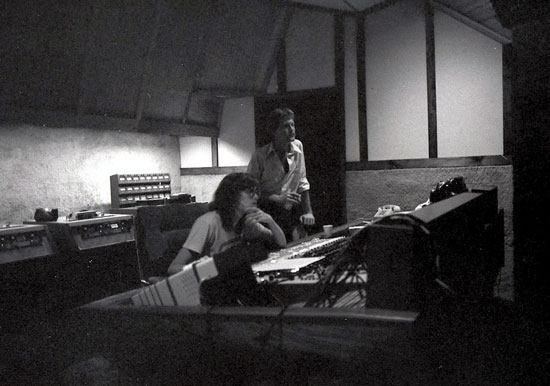
Ann Holloway and Joe Harris, TK Studio
photo by Jimmy Johnson
Debbie: In The Eagles, yeah. And she was not real happy, and so we definitely paid the price. AND that nasty high-end (treble) that's on there (the album) is because of drug use, and it kills your high-end (hearing), so you're gonna crank up more high-end in it.
And naturally, I'm in the (control) room there, so what am I gonna do? Am I gonna sit there and watch somebody do drugs? Of course I was friggin' doin' it! It was just me and her; she would let me hang out....Jeff: You said that Ann would listen to your input about the mixing, but that she had last call. (The final say on the mixes for the album)
Debbie: Yeah, yeah, she had last call.
Jeff: And her brother was the engineer as well.
Debbie: Oh yeah. Well, her brother was much more clear-headed, and I...Tom was actually...I would've trusted him to mix the whole album. But also, Ann insisted on re-doing all the bass parts on the album. And had me re-do a lot of Allan's parts on the album.
Jeff: You said you stopped her from replacing ALL of Allan's parts
Debbie: Yeah, yeah, because you needed his frenetic feeling. It was more the rhythm stuff that he played, some of the stuff, but his leads, he KNEW! There's no way in hell that he's not gonna know (that his parts were replaced).
Susan....she could tell right away.Jeff: What was her reaction?
Debbie: She, ahhh...she was already seeing (future husband) Alex at that point, so I don't really think she gave a flying you-know-what. You know? And I don't think it was necessary (to replace Susan's bass parts) because I thought they were fine. Susan's parts were EXACTLY what she played onstage, and didn't need replacing...but it was just, Ann had a different idea of what her bass parts should be.
Jeff: Well, Tom Holloway insisted that Ann knew all about rock music, and I told him that I thought The Cichlids wanted the album to be like "Rocket to Russia", and instead Ann made it more like "Get The Knack".
Debbie: Yeah, exactly, and the parts that were being played on that record, did not serve themselves well to a "Get The Knack" treatment. You just can't...pour them into that jar.
Jeff: Obviously you couldn't do anything about Ann Holloway, but do you think the album would've been better if...obviously it wasn't all recorded at the same time, there were multiple overdubs....
Debbie: I don't think it would've been better live.
Jeff: Really?
Debbie: No, I don't think it would've been better live. Look, the drummer went in there He's so friggin' brilliant! He went in there and played the entire record without anybody else playing.
Jeff: With no metronome, no click track.
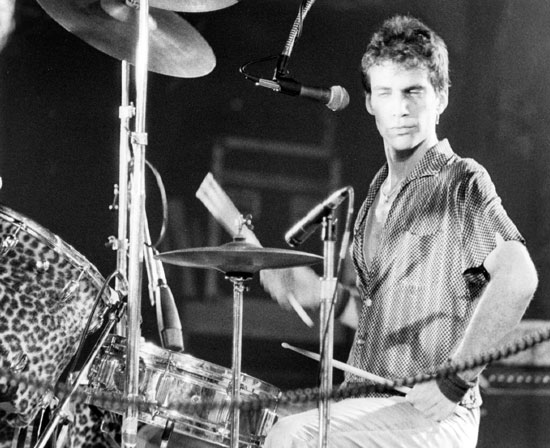
The Drummer
photo by Jimmy Johnson
Debbie: No metronome, no nothing. He's such a friggin' machine! Cause she (Ann Holloway) didn't want leakage onto the other tracks. (NOTE-when a band records in the studio, if they all play together, it's very difficult to get separation of ALL instruments, drums bleed onto guitar tracks, guitar amps get picked up by the vocal microphone, etc etc) Understandably, because look, we were not the best players, and somebody's gonna make a mistake, it would have probably taken ten times longer to do that, if we did it live.
But I also think that a lot of stuff could've been allowed to slip through that got played over and over again. It starts to get very sterile and burnt out. And of course you know about the Tommy Boyce situation? Boyce and Hart, you know Boyce and Hart? (very famous and successful 1960s songwriters) One of them, I'm pretty sure it was Boyce, was supposed to get involved in it. TK Records exec Steve Alaimo brought him in, because of Alaimo's contacts (in the music industry). And, Robert pissed him off and that went out the window. I was so excited, being a huge Monkees fan, yeah, are you kidding me? Again, anytime Robert felt something was getting out of his grasp, or he might become obsolete, he found a way to shut it down. And that's when it really started getting bad, because that's when things were starting to get out of his control. You know? They (TK Records) didn't want him in the studio at ALL, because he was a total asshole.Jeff: What about "Lifeguard Dan"? There's some disagreement about that song, some people say it's great, the drummer said it was completely wrong for The Cichlids. What do you think?
Debbie: I don't know, man, I think it was I think it fit. I don't think he (the drummer) was happy that it ended up being the single, but it was um .
Jeff: Were you happy it ended up being the single?
Debbie: Look, I was surprised as hell, I wrote it in the car on the way down there (to the studio), cause we needed one more song. And it made everybody happy, and it was FUN! It was a fun song. I mean, I'm still like, "Oh my god," when I hear it, but...It made people happy, people enjoyed it, so...Again, I was very surprised they chose that for the single, (but) it worked! And it was a total rip-off, I mean it's got every surf song ever known to mankind in it, but I wouldn't apologize about it, I wasn't trying to hide it. And anyways, The Beach Boys owe it to Chuck Berry, so...you know; we're just tossin' the ball from one to the other. But hey, it's a fun song.
Jeff: The drummer mentioned that by the time you made the album, he was starting to feel estranged from writing with you, and the creative process in the band, and he thought he was being frozen out by Robert because they didn't get along
Debbie: I was aware of it. I think the drummer thought that I was able to direct Robert to do what I wanted him to, which was not the case. But also, the stuff (songs) that the drummer was bringing to the table, at that time, was just really bad.
Jeff: Because of drugs?
Debbie: I guess. I guess. And he was becoming a huge problem with that. But, of course he's also a brilliant part of the band, and an incredible drummer, so I'm trying to mitigate the problem and
Jeff: Good drummers are very hard to find.
Debbie: Extremely, especially ones that don't overplay. And he did have the ability to write. But he was coming up with such crap...And with (Allan) Portman, the same thing. His stuff was just...If they came to the table with good stuff, it would've been up there. But, personally, I didn't think Portman had it in him to write good stuff, and at the time, the drummer was too fucked up to do it. And it's a crime; because he actually is...he's a good writer.
But yeah, things were already starting to...the fuse was lit, and it was sparkin'.Jeff: Allan Portman later said, "Debbie and the drummer didn't want to share the spotlight with Susan and myself. And that wasn't right because I was singing a third of the set. And when I objected to that, Debbie and the drummer got rid of me."
Debbie: Ah, that wasn't exactly how it went. I'm sure that's how he FELT it went.
Jeff: Other people have said that Allan was "too big for his britches" at that time.
Debbie: That's basically it. And again, he wasn't getting slighted. He wasn't performing his own songs, but he was performing he was given a huge part of the show. And also, his guitar playing was not improving, and he was just some of the leads (solos) that he was doing were just like, scary bad. And sometimes it was good, but you couldn't...
Jeff: I'll say it: your leads were better than his!
Debbie: Well, it's a matter of apples and oranges. But sometimes his kind of lead wasn't the right lead for that song, which, I think that he got pissed off about that too. But yeah, it's the typical thing where the band starts getting some notoriety, and if you don't have a good person at the helm that can be diplomatic and make things balance out, stuff starts to get unbalanced, and it's just like a tire, that's out of balance. Things start getting bumpy, and the tire falls off, and...that's what happened.
And it became quite obvious pretty quickly, how important a part of the band Allan was. But at the time, he was so damned annoying, that we just couldn't take it anymore. He was causing constant friction, between his constant friction and the drummer's issues And then Susan, of course, picked up on that too, and she was seeing this guy Alex, who was pumping her ear full of "You shouldn't do this, you shouldn't be doing this, you should be doing this." That didn't help either. She had definite legitimate gripes, but we all did. Now, you do know also, that when Portman separated from us, that Johnny Depp was one of the people being courted to replace him?Jeff: No I did not know that.
Debbie: Oh yeah. Robert knew him from the record store (Robert worked at Record Haven), and we had several meetings with him, because Robert thought that he had a lot of promise. I think he was in The Kids at the time. And he was just a baby, I think he was only 16 or something, (NOTE--Debbie is correct, he was about to turn 17) he was really, really young, and I don't think his mom wanted him to have anything to do with us.
Yeah, I remember sitting at a picnic table, I think over at a...I wanna say it was at that Sub Center on Hollywood Boulevard, or something. I remember sitting at a picnic table and talking with him a couple of times. That almost happened. He was just the guitar player for The Kids at that time, he wasn't famous or anything. But yeah, that was on the table right after Portman had left. But it was kinda clear, even back then, that he was just, he had that star quality even then. Cute as could be, absolutely gorgeous. But yeah, that almost happened. I know Robert tried his hardest. But I think it would have been a big mistake.Jeff: Really?
Debbie: Yeah, I don't think he would have fit in the band; he was more glam than punk. I'm glad things happened the way they did for him.
Jeff: You told me once you thought that in some ways, Allan was the most well-adjusted of all the former Cichlids.
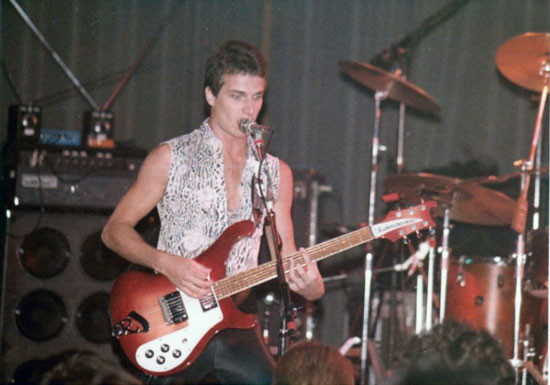
Allan Portman
Debbie: He is.
Jeff: How so?
Debbie: I don't know; he's got a business going. You can talk to him; you can sit and have a conversation with him. He never really went off the rails with substances or anything, and...he just seems the best-adjusted. I spent time with him when we did the reunion gig. And I was struck by...I don't know, how he just didn't buy into the whole music cult, but he was still playing and everything. But he also had a business, was...never really ended up in huge trouble. Again, when I talked to him, he just doesn't seem to have any of those...I don't know how to put it
Jeff: You think over the years he's lost some of his inflated sense of self-importance?
Debbie: Oh yes, he definitely has. I mean, he still has good self-esteem, and enjoys his music, but it's in proportion, you know? And he can function in society normally I, I don't even know how to explain it, it's kind of intangible, what I'm talking about. But he's...I don't know, it just doesn't seem like he's got any of those...
Jeff: Demons?
Debbie: Yeah, demons. The demons aren't there. Well put. That's why you get the big bucks. (laughs)
Jeff: Ok, let's say Allan has zero demons, and Susan has 2-3, and the drummer has 10. How many do you have?
Debbie: Well, I'm probably about midway there.
Jeff: All right, so you've got about 5?
Debbie: Yeah. I'm keeping them well in their cage.
Jeff: Cause I think you're pretty damn well-adjusted.
Debbie: Yeah, but it takes work! (laughs)
Jeff: That's true. But it takes work for everybody.
Debbie: Yeah, it takes work. But...I don't know, I think...They used to be able to run loose on me back when I was younger. But I've got em well tamed down, they've all got collars on I just pull them out when I need to be interesting. (laughs)
Jeff: What did you think of the Used People EP? (Allan's post-Cichlid band)
Debbie: I thought it was cute. I mean, it wasn't the greatest, but it was Portman, he's always quirky. It's not my space, but it was definitely "Nelly" (Portman's nickname) material, and it was so cute .
Jeff: So exit Allan. Barry Seiver comes in, he's a good player, but the drummer said it was "too perfect." Do you agree with that?
Debbie: It was. And he also...Barry has SO much energy. And (he's) an amazing guitar player, I mean ridiculous, he could run circles around any of us...
Jeff: Charlie (Pickett) seemed to think part of the problem was that Barry was too tall, he didn't fit in.
Debbie: It also threw off the delicate balance because Allan's Nelly-ness was an important foil to Susan's silence, and the drummer Yeah, there was a very delicate balance. And things started going off the rails even more, and that's NOTHING against Barry, cause he's a hard worker and a good guy. And can play his ass off. And I went on to play with him in Nouveau Reach too. But for that particular line-up, he was too good. He was too good. He could not underplay enough to be a Cichlid.
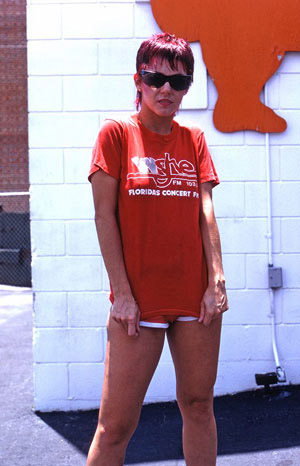
Debbie, definitely in Gainesville,
possibly tripping, July 1980
possibly tripping, July 1980
photo by Jimmy Johnson
Jeff: And you mentioned to me before about the tripping on acid in Gainesville, and running into your ex-boyfriend that you thought was dead, do you wanna talk about that?
Debbie: Oh my god. That's another one of those things that you just can't make up. Yeah, his name was Steve Mathis, and I had gone out with him briefly in high school. Not briefly, maybe six months or so. But word had gotten around that he had gotten killed in a drug deal. My parents had told me that, and a couple other people also, because that was the rumor, I guess he had moved or something. And we're at the parking lot of the Travelodge (Motel), on University (Blvd.) in Gainesville, and we had gotten hold of some purple microdot, I think, or something, we were all trippin' balls. And we're standing out in the parking lot talking. And I don't know, I don't think he even knew that we were there, he was just walking down the street. And we're standing in the front of the parking lot, and he comes up and goes, "Debbie!"
I turn around and look, and I go, "Holy shit, I am WAY too high." And he comes walking up, and it's him. "What are you doing up here?" "Yeah, I'm livin' up here now." And it was so good to see him, because he was such a nice guy. Beautiful boy too, absolutely gorgeous. And then, eventually, after I came back from New York, my Dad's reading the paper, and he actually did get killed. He had bought a new motorcycle, and he was on his way home, and he hit a car head-on, and got killed. One of the weirdest things that ever happened when I was high.Jeff: The Cichlids tour, was New York City the destination?
Debbie: Actually...I think it was really only supposed to be the southern area, because we were planning on coming back. Um, I thought we were going...It was so badly planned, and Robert didn't even have the gigs booked ahead of time, we basically got there (Gainesville), well, he had the one gig booked up there, I think.
NOTE-In the interest of fairness, we solicited Susan Robins' opinion about the interview, and she offered some STRONG contrasting opinions about what happened in Gainesville, that ended her time in The Cichlids.
"The part about Alex is not how it really happened. During my entire time with the Cichlids, Robert Mascaro didn't want me to have outside influences of any kind (family, friends, or boyfriend) so when I started dating Alex, he told the rest of the band (and entourage) lies about him. Alex was screwed over badly by him and did not deserve it. He had not been manipulating me. He was excited to be dating a Cichlid.
Alex came up to Gainesville because Mascaro invited him. This is how it happened: While in Gainesville, Mascaro had done something that scared me into wanting to leave the band, so he invited Alex to come up to help out on the tour as a way to keep me from leaving. Mascaro's idea, not Alex's. I don't know what Mascaro told the rest of the band about why Alex was there (obviously not the truth), but he talked a few of the guys on the tour (I won't give names) into literally beating Alex up in an ambush."
"The part about Alex is not how it really happened. During my entire time with the Cichlids, Robert Mascaro didn't want me to have outside influences of any kind (family, friends, or boyfriend) so when I started dating Alex, he told the rest of the band (and entourage) lies about him. Alex was screwed over badly by him and did not deserve it. He had not been manipulating me. He was excited to be dating a Cichlid.
Alex came up to Gainesville because Mascaro invited him. This is how it happened: While in Gainesville, Mascaro had done something that scared me into wanting to leave the band, so he invited Alex to come up to help out on the tour as a way to keep me from leaving. Mascaro's idea, not Alex's. I don't know what Mascaro told the rest of the band about why Alex was there (obviously not the truth), but he talked a few of the guys on the tour (I won't give names) into literally beating Alex up in an ambush."
Jeff: Jimmy Johnson said it was a gig in Gainesville, a gig in Tallahassee, a gig in Tampa that got cancelled, then back to Gainesville, and stuck there for a week.
Debbie: Yeah.
Jeff: And the next gig was supposed to be in Atlanta.
Debbie: Right. But don't leave that many people with idle hands for a week, cause nothing good could come of it. And nothing good came of it, believe me. And also, there was a lot of animosity cause the beauty shop owners had moved up there, and had a really nice house in a beautiful area of Gainesville, and Robert and I were staying there. Susan was too, at some point she came and stayed with us over there also.
Jeff: And Alex? (Susan's fianc e)
Debbie: No, Alex wasn't up there yet, Alex came up there right at the end, and was the whole catalyst for the whole thing blowing up like it did.
Jeff: The drummer said he was interfering in band business?
Debbie: BIG time. I mean, Susan was already ... Susan already had one foot out the door, but Alex had been, for WEEKS, pumping her full of crap. He thought he was a journalist, and thought he knew everything, and, 'You're too cool for this," and blah blah blah. And...it did not give any excuse for what (some folks) did, I...still...
Jeff: Were you aware that Robert was winding the drummer up to punch out Alex?
Debbie: I was not ... because I was in the car on the way over there, but I didn't even know what was going on until right before it was gonna happen. And I was in the back seat of the car, I could do nothing. I mean...it's amazing it's just like, I dunno...It was like "The Purge" or something, you know? It was just...people behaving like beasts...Everybody was so pissed off because he (Alex) was basically breaking the band up, ok? And even though she (Susan) said he didn't, he did, he had been manipulating her for WEEKS...about that. Cause he just didn't like the fact that Robert didn't want him involved in the organization.
But, again, no justification for what he (the drummer) and others did, but it was basically ... everybody's frustrations from sitting there all that time, it was a perfect storm. Unfortunately, he (Alex) became the focus for their anger. And people that I NEVER thought would do stuff like that, got involved. It was not a good thing; it was not a good thing.
But once that happened, it was finished. We weren't gonna replace her (Susan), cause it was...we all knew, and people wouldn't admit it, but I knew the whole chemistry of the band was shot anyway, so...And I think we headed up to New York more for the fact of not coming back to town with our tail between our legs, than for any hope of doing anything, because it was just me and the drummer and Robert, I mean what are we gonna do? Go up there and try to play with New York bands? I don't think so.
Tony (Mancino) tried to get me to go home with him, instead of going to New York with Robert, but I thought, "I'm gonna go to New York, and see it." So we went up to New York.
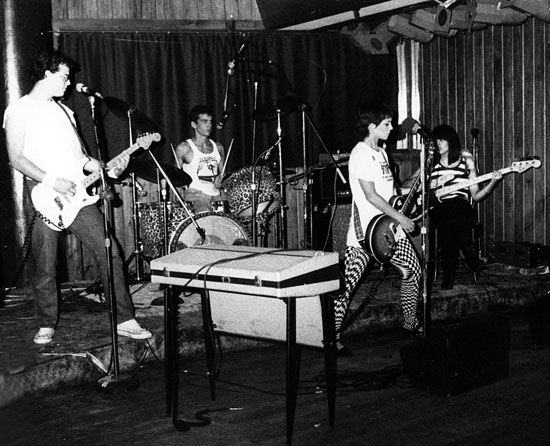
Cichlids rehearsing in Gainesville, July 1980
L-R Barry Seiver, "the drummer", Debbie and Susan
L-R Barry Seiver, "the drummer", Debbie and Susan
photo by Jimmy Johnson
Jeff: How long were you up there, a week or two?
Debbie: Yeah, a coupla weeks we were up there, we had gotten a...we got an apartment...I think we had, like $400 on us, and walking through the city with all this money on us, with homeless people following us, I thought we were dead. But...you think you're invincible at that age. But we got an apartment, and we were only in there a coupla days before I blew outta town, because...the drummer was trying to get work. Robert, of course, wasn't trying to get work because Robert didn't work; everybody else worked except him, and supported Robert. But his plan for the next day was to go to New Jersey, and one of his friends, one of the people we stayed with when we first got up there, his father was all mobbed up, and owned a strip club. And Robert's brilliant idea was that I should go get a job there, because I could support EVERYBODY with the money that I was gonna make! And also we were gonna go visit his grandmother while we were in New Jersey.
At the same time, I had been calling my parents on a regular basis, and they were planning on going to The Keys...Heh heh heh...
Jeff: No-brainer there!
Debbie: Work in a strip club? Or get home in time to head out to The Keys? So the next morning at 5 o'clock, I went. The drummer was actually pretty cool about it, 'cause he knew I was doin' it. I told him what I was gonna do, I said, "Look, I can't take this anymore, I'm not gonna go strip, I'm not gonna do it." I grabbed two suitcases, a guitar, a train case, I mean; I don't know how I did it.
Jeff: You grabbed as much as you could carry.
Debbie: Yeah. Ran down four flights of stairs, got in a taxi, and went to my grandmother's house, who lived in Brooklyn. I think the drummer left the same day.
Oh my god, I remember the first phone call from Robert, "What did you do? You broke up my band.""Dude, you were gonna have me stripping! I don't go there with that! That's just not me, you know?" And there really were no prospects up there either.Jeff: He had no conception of what he was asking you to do, to be a stripper?
Debbie: He thought it was cool. He thought it would be even better for my image if I did that. Yeah. I know who it's gonna be better for, it's gonna be better for you cause you're not gonna be workin', and...
Jeff: He's would've taken your money and...
Debbie: Exactly, and he's gonna be sitting around the strip club all day. So yeah, I bailed, got outta there .
Jeff: And later you wrote a song about it.
Debbie: Yes, I wrote "Letter On the Table" about it, and actually I started writing it while I was still in New York. But yeah, I guess I knew I was gonna do it at some point or another, but...it was interesting.
Jeff: You mentioned that you got to meet Jerry Lee Lewis while you were in New York City.
Debbie: Yeah, it was short but sweet, it was at the Ritz. I don't even know how we ended up getting back where we were, but I was super star-struck. And I'd met so many other musicians, but with Jerry Lee I was star-struck, I basically told him that his music did have an impact on me. Again, it was kind of like the original punk rock
Jeff: Sure, high energy.
Debbie: Yeah. He was already gettin' pretty old by that time, and he looked a little on the feeble side, but damn!
We also ran into Dee Dee Ramone on the subway, and had a nice chat with him.Jeff: Robert didn't come back to Florida then, but he did come back later on. Did you have any more interaction with him?
Debbie: No, he showed up at a Nouveau Reach gig at Flynns, the one that was on the ocean. He showed up there, and that was when my late husband Jamie (Swartz) was playing bass with us. (Robert) got into it with him in the lobby, called him something, "Fucking Jew!" or something.
It was all I could do to keep Jamie from punching him out. "I'm gonna kill that little .!" Yeah, yeah, he was ready to...I mean, he (Robert) was really relentless. And even when he called me the first time, "I hear you're with some Jew..." That was one of his big things, he was a HUGE anti-Semite. Yeah, big time. And then I think he also came to...I think he also showed up at another gig, maybe at the Playpen, I'm not sure, but...he was unhappy.Jeff: After you came back from New York City, how did you hook up with Fantasma Productions, your new managers?

Two Cichlids left, Autumn 1980
photos by Jimmy Johnson
Debbie: They had already done some gigs...John Valentino, he used to work at one of the publications. And then he ended up there (at Fantasma). And I think Robert had previously gone to him to talk to him about something, and then when we came back, the drummer and I went up there and spoke to him. I think we had gotten some gigs before with them, but we weren't signed to them. We would do contract by contract. But then we signed a management contract.
Jeff: The drummer said it was nothing against Bob Rupe and Derek Craig, but that it just didn't work.
Debbie: No, it just didn't happen, again, no chemistry. I mean, Rupe is awesome! Not only is he a great person, but he's a fantastic bass player, he has great taste. But it just did not work.
Jeff: Bob Rupe said it was made clear that he wasn't a member of the band, that he was just a hired gun'.
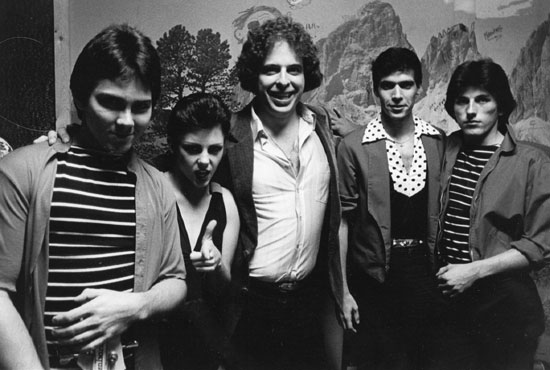
The last line-up of The Cichlids, Autumn 1980
L-R Bob Rupe, Debbie, Jon Stoll (Fantasma Productions) "the drummer" and Derek Craig
L-R Bob Rupe, Debbie, Jon Stoll (Fantasma Productions) "the drummer" and Derek Craig
photo by Jimmy Johnson
Debbie: Yeah, and the same with Derek, which, that was a huge mistake, doing that. We (the drummer and I) both let our egos run rampant in that situation. And there were substances...
Jeff: You talked to me about your relationship with Tony Mancino, but you also talked about what Tony saw that a lot of other people didn't see.
Debbie: Oh yeah. He saw me get hit...many times. Also, Tony told me later that over in Tampa, he (Robert) was using advance money from TK (Records) to pay for hookers and buy heroin. I said, (sarcastically) "Thanks Tony for letting me know this NOW. And oh, by the way, Tony, thank you for taking him to those places to get that." But ... whatever ... again, he was under the same spell everybody else was. Everybody just did whatever Robert asked them, and they did it for free. And sometimes gave their own money!
Jeff: Well, Jimmy Johnson, for example. Jimmy wasn't getting paid to take pictures of the band, and Jimmy wasn't getting paid to load up the gear.
Debbie: Hell no, and he definitely wasn't getting paid to take the SHIT that Robert used to give him! (And) Everybody! I remember, the FIRST thing that caught my eye, when I walked into that house in Dania, was a copy of "Mein Kampf"...on the shelf.
Jeff: WOW...
Debbie: A well-worn copy of "Mein Kampf". And I don't doubt that he read that cover to cover several times, and used some of the same because if you think about it, there are principals that are applicable in that.
Jeff: Ok, I wanna read a couple quotes from Steve Alaimo, from an interview he gave shortly before The Cichlids broke up.
He said, "As far as I'm concerned, Debbie is the talent. She's a terrific singer and a good little songwriter too. She has the potential to be really good. She could make it big; everybody who sees her is really impressed with her."Debbie: Oh God ... Love you Steve.
Jeff: He also said, "If The Cichlids had a song like "My Sharona" on their album, they'd have been huge. But they didn't. It's not like the album was never put out, it got good reviews in the trades (industry magazines), it got enough exposure in the US and Europe, that if it was going to be something, it would have been. The first thing that happens in this business, when something doesn't happen, is that someone wants to blame someone else for it. Their album wasn't a monster hit, but it was a good first effort. They'll be all right, you'll see."
And then right after that, the band broke upDebbie: Yeah, and that wasn't Steve's fault, and it was just basically stupidity, you know? And truthfully, on that album, there was no "My Sharona" on that album. And I'm not insulted by him saying that at all, because...it was good for what it was, and where it was. Probably, if Allan had never left the band, and Robert hadn't started feeling threatened about things getting out of his control, perhaps the next album might have been a better...There might have been songs on it that were a little bit more mature, a little bit better songwriting. Especially if that thing with Tommy Boyce had worked out, and we'd have had the advice of a writer
But you know, you've also got four kids that think they know it all, and aren't listening to anything anybody says. Steve was right, Steve knows what he's talking about. He didn't get where he was by being stupid.Jeff: Right, but do you think that both Steve Alaimo and Robert Mascaro were missing the contributions of the drummer? Because everything I've seen and heard, the band was at its best when you both had the songwriting going together
Debbie: Oh yeah. We would each start a song, and the ones that we wrote together, we'd give it to the other person, to fill in the blanks. And I think songs like that are better, because you get a balance, you don't get something that's so extreme from one picture or the other.
But, it was really really hard. There was so much hard feelings and animosity, especially with the drummer. And when his problem kicked in, he became impossible to work with.Jeff: Do you think the drummer had bad feelings toward you because he thought you were on Robert's side?
Debbie: Oh yeah. I think he felt that I had too much control, which I really didn't. I REALLY didn't. As a matter of fact, I think Robert would sometimes intentionally
Jeff: Maybe Robert would give that impression to other members of the band so he could keep everybody yapping at each other?
Debbie: Yeah, and he really should have been a diplomat, and not an instigator in that case because I think it probably would have worked out better. Also, if the drummer wasn't working as a DJ in a strip club, and doing coke all the time, it would have worked out better. That was huge because egos were what basically caused everything to fall apart ... And resentment. And Robert did nothing to resolve that, he only made it worse. And nobody was gonna say anything to try and fix the problem, because if they went against Robert, that's like going against Hitler.
But that's pretty much what caused the whole thing to fly apart. And we were basically just trying to stretch out the embers at the end of it, with everything else that we did. Even with Nouveau Reach, it was just trying to Give CPR to something that was long dead.Jeff: But you put a lot into Nouveau Reach, the cool flyers, played a lot of gigs
Debbie: Yeah, we did, I enjoyed it. But...we never got a total band that really worked well. And when the drummer left, the guy Mitch Auster (who replaced the drummer), overplayed so much it was ridiculous. I used to only let him bring half of his drum kit. One night he went and saw Ratt, and then came to the Playpen the next night with EVERY drum he owned. And I said, "Sayonara" at the end of the show. Nice guy, but not the right drummer.
And the same thing with Tony Way, our bass player, he overplayed like crazy. I was just like, "I cannot take this, I'm outta here." I was burned out, it was too much headache, and it wasn't worth it, the payoff wasn't worth it.Jeff: You said that Steve Alaimo wanted to put you in a disco band after The Cichlids?!?!
Debbie: Well, I was still under contract. And I don't know why I was the one that was still under contract, when everybody else wasn't, but...We talked about doing another album, and I was writing stuff, but it was not it was really not that good, it was the Nouveau Reach stuff, and it was not really that good, and it was not very commercial. 'And he (Steve) wanted me to ... first of all not have Tony (Mancino)involved in the production
Jeff: Which was a problem, because you were teamed up with Tony at this point.
Debbie: Yeah, by that time I was. Although it turned out that Tony didn't want me to perform in public, so that didn't happen while I was with him.
And second, he (Steve Alaimo) wanted me to have (song) writers write the stuff for me, and do dance music. Now, big mistake on my part, because I was thinkin', "I'm not gonna sell out!" DUH! IDIOT! Again, I was 22 at that time, really stupidJeff: Well, maybe you weren't so dumb, since disco was on its way out, and so was TK Records, for that matter.
Debbie: True, yeah, I'm not gonna prostitute myself for something like that. I just couldn't see myself doin' it, it would be like turning 180 degrees. But Steve meant well though. Because the stuff I brought to the table was uncommercial, and so I understand.
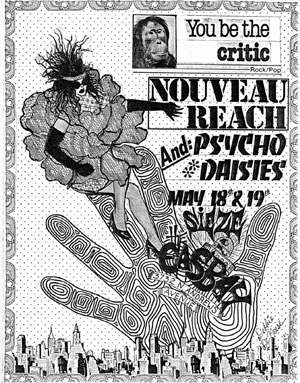
Jeff: You talked to me about when you were working at the bank, and making Nouveau Reach gig flyers on the clock, and on other substances .
Debbie: Oh yeah. I would take like, a quarter of a hit of windowpane acid, or blotter, or whatever was available, and go down there and work. And then do cut and paste, because we didn't have Photoshop back then, and just make up all the Nouveau Reach flyers. And I was in there and, I mean, my hair was kinda purple. I was in the basement, so nobody saw me.
Jeff: Right, you didn't have any contact with customers.
Debbie: No, I would literally come home from a gig the night before, and walk in the door, and get changed, and go right in (to work), sometimes I'd still have the make up on, I didn't wanna be late, so yeah, it was kinda fun...I wouldn't take a whole hit of acid at that time, because I didn't want to...I had to answer the phone, and I didn't want to be laughing at people
Jeff: Yeah, a whole hit might have been a bit much, everything MELTING while you're trying to talk on the phone.
Debbie: Yeah, a quarter hit was good.
Jeff: Acid usually has a little speed in it too, so that would come in handy.
Debbie: Yeah, to help me stay AWAKE! (laughs)
Jeff: Ok, Nouveau Reach had a few lineup changes. Barry Seiver was on guitar, Leo Casino was on saxophone, the drummer was on drums, then later Mitch Auster. Tony Way was on bass, later replaced by Jamie Swartz. And somewhere in between there you had Johnny Salton on bass for a minute .
Debbie: Yes we did! That was very brief, we never performed out, but he was so talented, he could do anything back in the day, yeah. He was just fantastic.
Jeff: And he was officially announced as the bass player in early 1984.
Debbie: He was, but it just didn't work out, he was doing other things too, and it just
Jeff: Yeah, he was playing guitar with Charlie.
Debbie: Yeah, he had other commitments, and you couldn't get him to ... Same thing with Jamie, I mean Jamie was always working, we couldn't ever get him to ...
Jeff: Jamie worked at Spectrum Studios.

Nouveau Reach onstage, L-R Barry Seiver, Debbie, "the drummer" and Leo Casino
Debbie: Yeah, he was working all the time, so ... And that's where Tony Way came in, poor Tony Way ... One time we bleached his hair, and we convinced him to let us bleach his eyebrows too. He looked hysterical!
Jeff: And Nouveau Reach opened for the Psychedelic Furs, how did that go?
Debbie: That was a lot of fun. I adored that band, they were so friggin' awesome. Actually that was the first time Jamie's father met my parents. Unfortunately the sound wasn't very good, the sound was way too loud, and not very good quality, in the audience, onstage it was good, but somehow it was distorted...
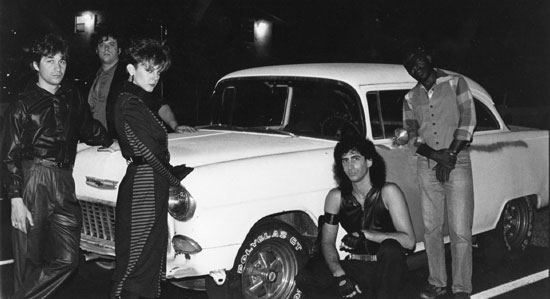
Nouveau Reach and a 1955 Chevy
L-R Jamie Swartz, Barry Seiver, Debbie, Mitch Auster, Leo Casino
L-R Jamie Swartz, Barry Seiver, Debbie, Mitch Auster, Leo Casino
Jeff: Where was the show?
Debbie: Sunrise Music Theater.
Jeff: Oh, so you got to return to the scene of your previous triumph! (The Cichlids played there)
Debbie: Yeah!
Jeff: And you probably didn't have a temperature of 106 this time. (Debbie was really sick when The Cichlids played Sunrise)
Debbie: No, this time I was actually healthy, and it was fun, but again, I never had the hunger with that band (Nouveau Reach) that I had in The Cichlids.
Jeff: Really?
Debbie: I mean, I enjoyed playing the music, but I kinda knew that it was...Instead of writing what I wanted to write, I was writing what would sound good with other songs like that in the matrix. I was over-thinking it, over-thinking the commerciality of it. And don't get me wrong, there's some songs that came out of it that were fairly good, but I wasn't doing the same thing. What I would be writing in The Cichlids, I wouldn't give a damn what anybody else thought, I was writing what I wanted to write.
Jeff: The drummer's opinion was that you were concentrating too hard on "Can't Beat the System", and you should have been focusing on "Little White Dot", do you agree?
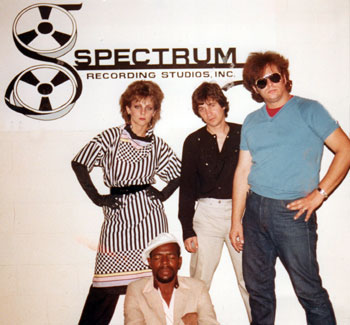
Nouveau Reach at Spectrum Studio
L-R Debbie, Leo Casino, Jamie Swartz and Barry Seiver
L-R Debbie, Leo Casino, Jamie Swartz and Barry Seiver
Debbie: Yeah, absolutely, we shoulda been sticking to the...He's right.
Jeff: Is that when the drummer left Nouveau Reach?
Debbie: The drummer left...Basically, I separated with the drummer when he didn't show up for rehearsal one night, and I go, and he was doin' coke in somebody else's house, and peekin' out the curtain, lookin' at me, while we're sittin' there waiting for him to show up...
Actually that episode kind of burned me out on the music business altogether. I stopped, I quit for a while. I didn't even get Mitch (Auster, the drummer's replacement) for a while. I went over to Jamie's apartment, and said, "I can't deal with this anymore." I was so burned out, I had just had it. Pretty much after that, I didn't wanna do it anymore.Jeff: Were you happy with the Nouveau Reach record?
Debbie: Oh, it was interesting. I think Tony's (Mancino) mix on "After The Siege" was a little gimmicky, at the time. And I didn't really agree with all his mixing ideas. But I don't mind that single It's kinda interesting. The demo that I did after that is really awful.
Jeff: And I'm guessing the tapes are probably long gone?
Debbie: Oh, I have absolutely no idea where those are.
Jeff: You told me that Jamie Swartz had drug problems.
Debbie: Oh yeah, big time. And for everybody that knew him, it was no big secret. He had drug problems, and I didn't even know it when I met him, he had drug problems, and they NEVER stopped.
Jeff: But you said they weren't what killed him?
Debbie: No, they weren't. And they (the doctors) never really gave an answer, they said secondary (cause of death) was chronic drug abuse, but there was no...it wasn't an overdose, it wasn't .they didn't show that it was...heart failure...They were asking me!
Jeff: You never got a concrete answer?
Debbie: Never. Even when the tox (toxicity) screen came back, it found out that he was below therapeutic levels on the one medication he had in his system. I mean, when the coroner calls YOU the day after the autopsy and asks you if he had been sick or anything. I didn't say it this way, but I'm like, "Dude, you just opened him up, took him apart, and weighed all his parts, and you're asking ME? Isn't this supposed to be your job?" Yeah, he never got over his mom's death is basically what happened. He was so traumatized by that; he was one of those real sensitive people. He drank right after that and when he quit drinkin', he started doing HUGE amounts of drugs. Basically the whole time we were married, he was doing painkillers.
Jeff: That's gonna kill you eventually.
Debbie: Yeah. I mean his liver was in pretty bad shape, and his lungs were also pretty black. He smoked everything but none of that is what killed him. I think it was sleep apnea, personally. Because he had gained some weight ...
Jeff: And nobody knew about sleep apnea back then.
Debbie: Exactly. Because he would wake up and, coughing and choking, and heavy snoring, waking himself up. I think personally, that finally one time he just didn't wake up. And of course, I'm sound asleep, and I couldn't hear anything going on. Yeah, that was weird. It's one of those experiences, it's NOT the way you wanna wake up in the morning, trust me. (laughs) "Hello! You're not snoring, something's really wrong! Ooh, you're cold." (laughs)
That whole year after Jamie died, I don't think I was ever right, things were SO bad at that time. And I called Susan up and said, "Jamie died!"She said, "WHAT??"Jeff: So you had reconnected with Susan before Jamie passed away?
Debbie: Yeah, we were hangin' out. And then two weeks after he died, we had Hurricane Wilma. Things were in SUCH turmoil.
Jeff: WOW. So tell me about your musical activities after Nouveau Reach.
Debbie: I worked in the studio, we (her and Jamie) opened a recording studio, and I worked there.
Jeff: What was the name of the studio, and where was it located?
Debbie: Concept Sounds. It was across the street from the coroner's office by Broward Blvd, south of Broward Blvd. Next to the railroad tracks. Yeah, we were there for a pretty long time, about ten years, I guess. Before that we worked over at Hollywood Studio. I don't know if it's still there. So we did that for about 15 years.
I was doing Techno records when we had Concept Sounds. Actually I have about 12 albums that are still out there, on Neurodisc Records. Techno-based, you know the stuff they listen to in the low-rider cars?Jeff: Yeah.
Debbie: Bass Connection...If you look up Bass Connection, and Debbie DeNeese, it should pull up the whole thing. Neurodisc Records, we started Neurodisc Records up in the studio, we had a couple of partners. But Jamie's drug use was so bad, that he kept fucking everything up. I was writing an album a month, cranking out an album a month, programming it on MIDI. And when I'd go get him to mix it, he would be passed out in the lounge, so it ended up, the last couple I mixed.
And then we went, and I did an album for Joey Boy Records, "Terra Infirma". And again, Jamie they brought somebody else in to do another session up there, and Jamie fucked it up. So I basically bailed outta that. Also, people were starting to come in to the studio with guns in their boots, and the only people that were coming in were rap artists, and they were not of the best caliber, because everybody else figured out that with all the new home recording stuff, for the price of one album, you could buy your own setup, so why do it?I'll give you the information (just go to discogs.com and search for Debbie DeNeese). You're gonna die laughing when you hear the stuff.Jeff: Hey, that was that era.
Debbie: Yeah. And it was fun, and it was easy. Yeah, it was easy money, I was making ten grand an album at one point, and doing an album a month. But, you know where all the money ended up going? I don't have to tell you. (drugs)
And when we separated from the record label (Neurodisc), from our partners. We took the studio, and they took the quote/unquote "copyrights". And we had an attorney, and we were sitting down in a room, to negotiate with them, what was going on. What they didn't know is that I had already found out...This is when the internet was still pretty new. I had found out that they had already SOLD my songs to a distributor, to another label, and were licensing my songs. They had fraudulently sold the copyrights that I owned.Jeff: Which would be a good bargaining chip for you to have.
Debbie: Except that the sonafabitch attorney took a phone call, and left the room, and somehow the label found out that I knew, instead of catching them off guard. He started talking about it, and the very minute he started talking about it, he takes a friggin' phone call right at the very minute that when we would have been able to play them. And they managed to get together, and get a strategy, make some phone calls And he comes back, and the WHOLE element of surprise is gone, and they've already got things worked out.
So we ended up, not giving ALL the copyrights away, but a good portion of it, so that we could keep the studio, because that's where we were makin' money. I still get $4.56 royalty checks, I don't even know where it comes from.Jeff: It's not from TK!
Debbie: Definitely not from TK. I got a gold record for engineering the Linear song, "Sending All My Love", I don't know if you've heard it, I worked on that. So I did finally get a gold record. I actually sing back-up on it too.
Jeff: Do you feel like a female rock pioneer? Do you think about it, when you see a girl playing now, that you helped make that possible? Cause there wasn't very many females doing it back then.

Two different versions/pressings of the Cichlids album.
I'm guessing the bootleg is on the left.
I'm guessing the bootleg is on the left.
Debbie: No, that's very true. It was really hard. It was one thing to be a singer, but to be a guitar player, or a bass player, and to be taken seriously. I mean, I have to give a lot of credit to The Runaways, because they did they really weren't that well known yet, but they did give girls the incentive to say, "If they can do it, we can do it too!" For The Bangles, and everybody that came along after that.
But, I never really even thought about it like that. I never, ever looked at it like, "Because I'm a woman, I can't do that." I just liked to play guitar, and there's no reason in the world why I shouldn't do it. And yeah, I got made fun of a lot by other bands, I never really considered myself a pioneer. But it would be nice to think that, it would be nice to think there were some girls out there that decided to go and play because they saw us play.Jeff: Or heard about you, or read about you.
Debbie: Yeah, it's interesting, a girl over in Japan found our record in a record store. Chihiro Isadora. That, to me, is pretty cool. And then they covered "Bubblegum", I just thought that was ... I can't remember the name of her band, but she's my friend on Facebook. I did hear it once, it's really, really cute. They're actually quite good.
Jeff: I saw the statement from TK Records, and it said that about 3,000 copies of the album were sold. Were you aware that the rest of them ended up in a dumpster?
Debbie: I was not aware of that, I had no idea. But, you know, I was realistic about the amount of records that were sold, I had no expectations to get a gold album, I ended up getting gold later on, but not for that.
Jeff: Which brings up another thing that's not in my notes. I've heard stories over the years from various different artists, about overruns intentionally done at a pressing plant. And the reason that I bring that up is that there's two versions of the "Be True to Your School" album, and they're supposed to look the same, but when you have them side-by-side, they're quite obviously different.
Debbie: Yeah, there are definitely two different covers for sure. I don't think I have both of them. But it's kinda wild that it exists. There's few enough of them out there, but I still hear stories of people finding them!
Jeff: So in 2004, you re-connected with Susan?
Debbie: Yes. I'm trying to remember exactly how ...Jim Johnson somehow put us in contact with each other, and we met someplace, and it was awesome. We had been texting back and forth, and stuff. And really, we didn't go there with that stuff that happened up in Gainesville, it was just so much water under the bridge, and it was really just so good to see each other again after all that time, that we basically just caught up on what we had been doing up til then, and...Yeah, it was cool! And then, the LAST thing in the world that I ever expected that she would do, would be wanting to do the reunion. When I was asked to do it, I was hesitant to even ask her, because I figured, "She's gonna shoot this down immediately." But she got on board with it.
Jeff: Maybe because she got to play guitar instead of bass?
Debbie: That was a large part of it.
Jeff: She's a good guitar player.
Debbie: Yes she is. That was a great line-up, with Scott (Putesky, ex-Marilyn Manson) playing the bass.
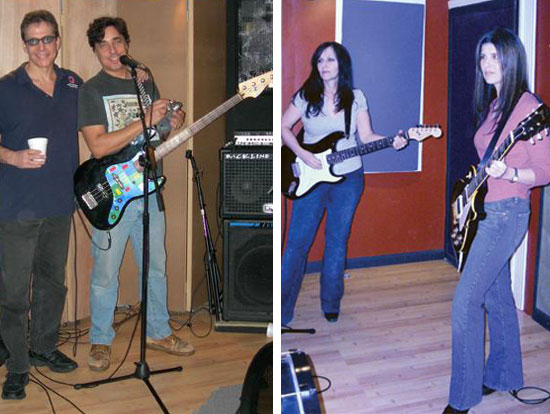
First version of the Cichlids reunion, January 2007
L-R 'the drummer', Scott Putesky, Debbie and Susan
L-R 'the drummer', Scott Putesky, Debbie and Susan
photos by Brenda Blake?
Jeff: Were you familiar with his work with Marilyn Manson?
Debbie: Oh yeah, I knew who he was, and I knew Marilyn Manson. And he's a really cool guy.
Jeff: Were you asking yourself, "Why the hell does this guy wanna play bass with The Cichlids?"
Debbie: Ahhhh yeah, basically. But I mean, it was a big event too. It was a big event, it would have been BIGGER, and less humiliating. (false laughter)
Jeff: It was a tough night.
Debbie: Yeah, it was a REALLY tough night. But he (Scott) was fine, really stayed in the pocket, and didn't try to pull any star stunts, and he was just really nice to work with. Fun guy, really smart guy. Really intelligent, good sense of humor.
Jeff: Did you know Allan was coming to the first Witkin gig?
Debbie: No, I didn't, and I was so happy to see him. Again, he was so normal.
Jeff: Ok, so the drummer melts down, first reunion is cancelled, exit Susan and Scott Putesky, enter Allan Portman on guitar and Rob Remias on bass. Did you enjoy the reunion gig, being professionally filmed and all that?
Debbie: Oh, it was fun. And it was the first time that (husband) Luis got a chance to see me play, with a band that he'll probably never see again. And again, we had a situation, Rob Remias is the nicest guy in the world, but we had a situation just like the Barry (Seiver) situation, because Rob Remias is SO high energy, and a very good player. And he stood in when we really had nobody else, so I was grateful. And he was EASY to work with, a really great guy. But it was another, "What's wrong with this picture?" He's big like Barry, high energy like Barry. But he sounded good, he didn't really overplay.
Again, it was fun. But it was never gonna be the same. And there was always that LITTLE bit of resentment going on there, like, "This isn't the way it was supposed to have been." And all those people that came, that paid money, and took off work, flew here, thinkin' they were gonna see us play...That was, it was really really hard.Jeff: The first Witkin gig. When you came back to the venue, you were devastated.
Debbie: Oh yeah. Oh man, I really was. I was between wanting to kill him, and crying. I was just, "This is just too much, gimme a break." Yeah, it was tough. And it wasn't just my disappointment; it was all the people that came. If it had been a small gig or something, and a lot of people hadn't made sacrifices to get there...
Jeff: Allan came from Texas, Kim Davis came from Chicago.
Debbie: John Daniels, Kenny Long, Jimmy Johnson, all travelled to get there. And these are people who could not afford that. And then, of course, Susan had acquiesced, and gotten involved in it, gotten all excited about it...
Jeff: And the band sounded great, was playing great.
Debbie: It was so smokin'. But what can you do, you know? The past is the past. You can't ever go there again. (laughs)
Jeff: Ok, so let's go there again. Charlie actually gave Rob Remias credit for getting Robert fired up to believe that punk rock could work down in Florida.
Debbie: Yeah, cause he (Robert) was managing him (Rob), Joey (Caleri), and Mike (Montgomery). And actually, Mike played with us for a while, we actually had Mike and Joey...and I think Diane (Barron) and myself.
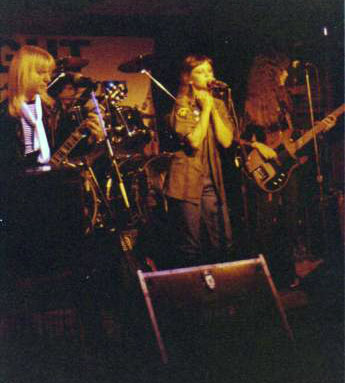
Cichlids line-up #3 at Tight Squeeze
L-R Mike Montgomery, Joey Caleri, Debbie and Diane Barron
L-R Mike Montgomery, Joey Caleri, Debbie and Diane Barron
Jeff: As The Cichlids?
Debbie: Yeah. It was Cichlids one point five, I think.
Jeff: Wow, I didn't know that.
Debbie: Yeah, Joey, I think he played one gig. I know he did rehearsals, over off of Dania Beach Blvd, in a warehouse back there. He definitely did.
All this stuff starts coming out when you scratch the surface. (laughs) We had a lot of people in that band. On and off.Jeff: I guess it took a lot of people to find the right combination.
Debbie: Yeah. And then to try and find it again, and never finding it again.
Jeff: There's only one classic line-up of The Cichlids.
Debbie: And it's a lesson learned.
Jeff: Don't mess with it.
Debbie: Exactly! Stick it out, put up with the assholes!
Jeff: Do you think that the film that was made of the reunion will ever see any kind of release?
Debbie: Oh Jesus, don't even get me started on that shit.
Jeff: You'd think that with Johnny Depp involved, they could get the damn thing released.
Debbie: I have no idea. I signed a release, like a year ago. Supposedly they were gonna be getting some kind of distribution. All I want is a copy of the goddamn thing! Both of my parents died without getting a chance to see it. And I'm thinking, "Well, I guess we're all gonna be dead by the time it gets released!" Just give me a copy of the footage of us, so I have something, you know?
Jeff: The drummer said you had no interest in continuing The Cichlids after that one gig, but he also said that Allan forced you to choose between him and the drummer, and you chose the drummer. Is that the way you remember it?
NOTE-Susan again--"Regarding Mad As Birds, it was a failed and frustrating attempt at recreating a different band that I absolutely loved being in when I was living up north years earlier. Mad As Birds didn't work because there was no musical chemistry between Debbie and me. We have vastly different tastes in music and it showed, resulting in an awkward, non-cohesive band."
Debbie: I remember Portman saying that, but I really did not have any intention of continuing. And it really didn't make sense without the drummer.
And later on, with the Mad as Birds thing, I did that mainly because I felt really bad that Susan was under-represented in The Cichlids. So I figured, "What could it hurt? Get up there and do some more, do some stuff." But, again, when people came to see that, thinking that they were gonna see The Cichlids...That was more of a mind-fuck than Nouveau Reach, that was even further out in left field. But we got up there and did it a few times, and I think she (Susan) got a chance to express herself, and play her songs.Jeff: And it was mainly her songs?
Debbie: Well, it was maybe 50-50. I just pulled back because the stuff that I had been writing really didn't fit.
Jeff: And you got to play Churchills!

Mad As Birds onstage at Churchills 12/27/08
L-R Susan Robins, Bobby "Boom-Boom" Gold and Debbie
L-R Susan Robins, Bobby "Boom-Boom" Gold and Debbie
photo by Karen Wideen
Debbie: Oh yeah, I'd always wanted to play Churchills. And that gig actually was pretty good. But the last gig that we played, it was like, "Oh my god, this is just " And we had Todd and Rob playing with us, and I'm thinking, "What the fuck am I going to all these rehearsals for?" Nothing against Susan, I just wasn't fond of the music, and...it was depressing me, I was getting really depressed playing it so, "I think it's time to pull the plug on this." And there were no hard feelings.
Jeff: Whose idea was it to bring in Glenn Newland and Bobby Gold? Cause that seems about the least likely rhythm section for you and Susan to play with.
Debbie: Bobby Gold, I think we were posting things about it, and Bobby Gold responded. Glenn Newland, I spoke to him at a gig.
Jeff: That's right, he played that dance music thing with Bobby Tak.
Debbie: Right. I spoke to him. He's a pleasure to work with. I really enjoyed playing with him. Bobby Gold He would've been great as a post-Cichlids replacement for the drummer probably, but not so good for Mad as Birds.
Jeff: And Mad as Birds did some recording. Did the tracks ever get finished?
Debbie: Good question.
Jeff: Do you have the tracks?
Debbie: Yeah, somewhere on my computer. I'll have to take a listen. I think she (Susan) wanted to come over and finish them, I just didn't wanna even listen to them again, to be completely honest with you. I'll talk to her, she might wanna remix them herself. I'd be happy to give her the tracks if she wants. She'd probably wanna re-do the vocals on ‘em, so I'd be more than happy to give her them.
Jeff: I'm sure she's glad you kept them.
Debbie: I keep ... even my crap, I keep. And I don't care if someone hears some piece of crap I recorded. I don't have an image to uphold, or anything. If you hear it, that's a part of the process that created who I am now, and who I was back then.
Jeff: So you say, "No regrets!"?
Debbie: Yeah! Everything you do is part of what makes you who you are. If you don't make the mistakes, you don't grow. And I am not afraid to let someone hear me make a mistake. But, not everybody feels that way, so I'm not passing judgement. I don't regret any of it. I would do it all over again. I might make a coupla changes, knowing what was coming around the corner
Jeff: Like signing with Sire Records, and saying, "Later Robert."
Debbie: Yeah, I would've told Robert to go fuck himself at that point.
Jeff: You have a home studio set up, with Pro Tools. Are you still writing and recording?
Debbie: I am still writing. I had to take a pretty long period of time off after that whole Mad as Birds thing, because I got so burnt out. But after that, I've been recording. Well, I record Luis more often than myself. I help him set up, and I play engineer. But I have recorded a few songs since then, a few that I have put on Soundcloud. And I'm workin' on a couple of other songs right now, which I haven't done in a LONG time. But I haven't really felt inspired. And I refuse to push myself to do something when I don't feel it.
ENDO©2016 Jeff Schwier